
Build my resume
- Resume builder
- Build a better resume in minutes
- Resume examples
- 2,000+ examples that work in 2024
- Resume templates
- 184 free templates for all levels
- Cover letters
- Cover letter generator
- It's like magic, we promise
- Cover letter examples
- Free downloads in Word & Docs

5 Nursing Cover Letter Samples & Writing Guide for 2024
- Nursing Cover Letter
- Nursing New Grad
- Nursing Instructor
- Registered Nurse (RN)
- Write an Outstanding Nursing Cover Letter
Nurses tackle difficult situations for their patients, providing care under stressful circumstances. Nurses are there when patients need help with medicines, a drink, or someone to talk to.
But despite tackling the most precarious situations at work, writing a cover letter to complement a nursing resume can feel more daunting than handling a crowded emergency room. Do you even have the time and energy after a 12-hour shift?
Luckily, we can help with our nursing cover letter examples and tips that will impress any medical director. Then, polish your application off with our free resume builder and AI cover letter generator to create stunning documents in no time.

Nursing Cover Letter Example
USE THIS TEMPLATE
Microsoft Word
Google Docs
Block Format
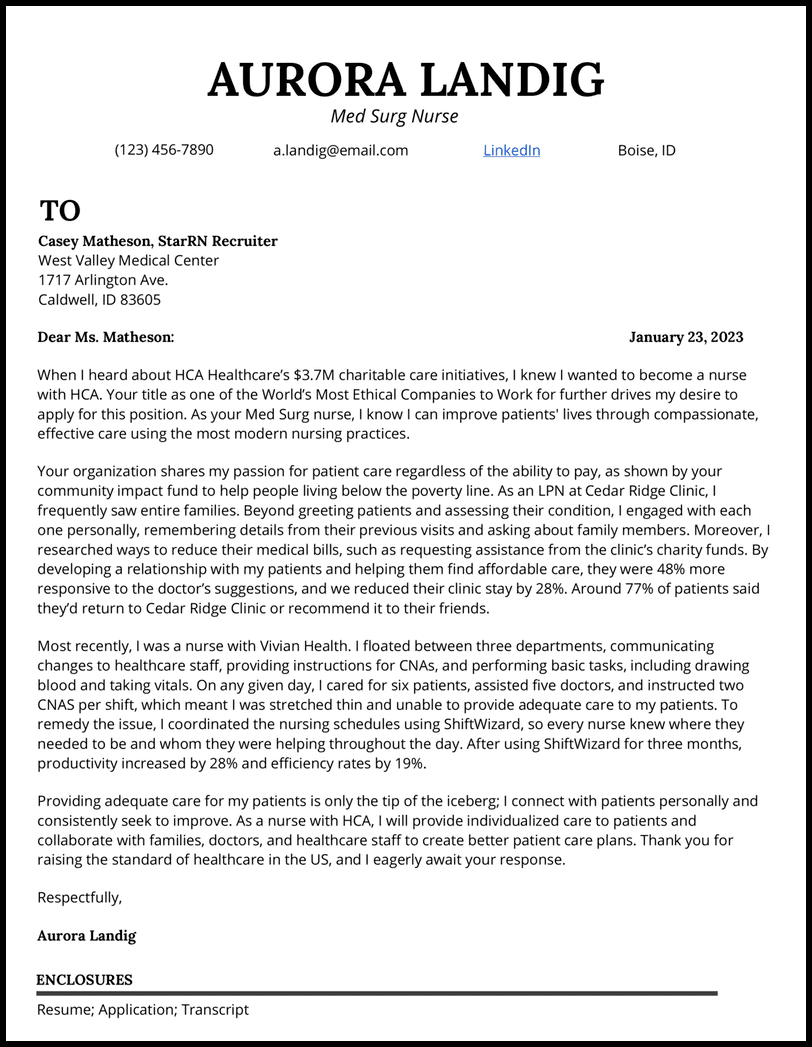
Why this cover letter works
- Especially in your opening and closing, include details like why you applied for the position, what you appreciate about the company, and what you hope to achieve in the future.
- Your cover letter isn’t the place to be modest; beyond just metrics, name things you’re good at and what you want to accomplish in your future company.
- Some good skills you can include are collaboration, leadership, and technical abilities. Just make sure your examples relate to the job description in some way.
- So long as you focus on your skills and how you can use them, you’ll exude confidence, not arrogance.
Level up your cover letter game
Relax! We’ll do the heavy lifiting to write your cover letter in seconds.
Nursing New Grad Cover Letter Example

- Luca perfectly executes this in his nursing new grad cover letter by sharing his stint during Hurricane Harvey, where he helped with wound care. Personal moments like these, supported with transferable skills, can be your lever into your professional world.
Nursing Instructor Cover Letter Example

- The hiring institution wants to see how you nurtured nursing students and generated an impact. So, go ahead and paint the town red with anecdotes of meaningful student engagements and measurable outcomes (Cue improving program completion rate by 8%).
Registered Nurse (RN) Cover Letter Example

- Describe a situation that reveals your expertise if relevant to the job description. Perhaps you were part of a rapid response team or alerted the doctor when a patient woke in the middle of surgery. Think back on a challenge where you emerged victorious.
- For example, if you want to be a critical care nurse, mention how your time as a forensic nurse helped you develop decision-making skills when helping patients with psychiatric disorders.
- Pick work experience according to what the employer needs. Are they looking for an ER nurse, someone with pediatric experience, or an oncology RN? Include experience within those fields.
- If you don’t have expertise in a particular area, talk about previous positions with transferable skills.
ICU Nurse Cover Letter Example
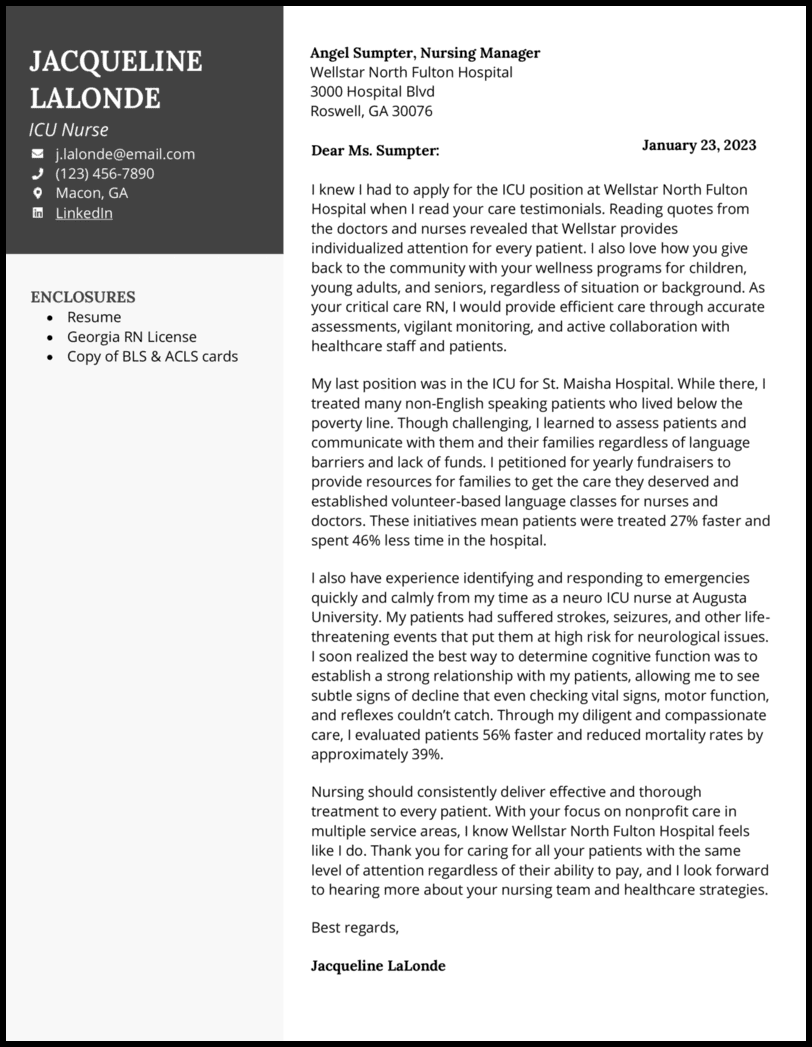
- Once you know what you do differently, you can measure your results against others and find the numbers you need for your ICU nurse cover letter.
- Double-check for special requirements, like a copy of your BLS and ACLS cards.
Does your nurse resume need a little TLC?
Hopefully, our cover letters have given you the confidence you need to personalize your own. Don’t neglect your nurse resume, though, because we’ve got tons of resume samples you can edit—just like this one here.
Nursing Resume
Need a resume to pair with your nursing cover letter?
or download as PDF

3 Tips for Writing an Outstanding Nursing Cover Letter

As a nurse, you know the value of research, critical thinking, and compassionate care for each patient, but did you know you can use those same skills to write your cover letter?
All you need is to research the company, share relevant successes, and monitor your tone to create a cover letter that will catch any manager’s eye.
Tip 1: Get to know the organization
You wouldn’t walk into a patient’s room without knowing their medical history, so you shouldn’t write a cover letter without some research first. But don’t worry—this research is far easier than studying for the NCLEX exam.
Start by looking at the job description and the company’s website. Once you know what the employer needs, find a way to incorporate their requirements into your cover letter.
Does the company need a certified nephrology nurse? Be sure to mention your time in a dialysis clinic. Do they want someone experienced in labor and delivery? Write a paragraph about your previous position as a midwife.
Don’t forget: similar to how you customize your care for each patient, you should customize your cover letter for each new position. Employers will have different requirements even if you’re applying for niche roles.
Tip 2: Go a few steps further than your resume
Repetition is usually good, but not regarding your cover letter and resume. Both are essential documents, but they should support, not mimic, each other.
Your cover letter is the best way to show your personality, which is especially important in nursing. Your employer needs to determine more than just your qualifications; they’ll want to know you’ll work seamlessly with their team.
To achieve this, include any experience and skills you have solving complex medical problems or times when your personality traits significantly improved your patients and the organization.
If you’re wondering where to start, look at this example from one of our cover letters:
As an LPN at Cedar Ridge Clinic, I frequently saw entire families. Beyond greeting patients and assessing their condition, I engaged with each one personally, remembering details from their previous visits and asking about family members. Moreover, I researched ways to reduce their medical bills, such as requesting assistance from the clinic’s charity funds. By developing a relationship with my patients and helping them find affordable care, they were 48% more responsive to the doctor’s suggestions, and we reduced their clinic stay by 28%.
Although this example includes metrics and responsibilities, it also underscores the nurse’s compassion and interpersonal communication skills, which are major green lights for employers.
Tip 3: Tone is everything
Nursing relies heavily on decorum and empathy, so your cover letter should sound professional and compassionate, but where do you start? Let’s walk through it step-by-step.
For example, a local hospital needs a pediatric nurse who’ll care for special needs children. Working with challenged children requires patience, high emotional intelligence, and strong critical thinking skills, so you’ll want to reflect those abilities.
To do so, start by picking what experience to include and what to omit to keep your cover letter to one page. Any longer, it will likely be thrown into the recycle bin since recruiters and managers have limited time.
Once you’ve condensed, work on adopting a kind tone. Use words with positive connotations, limit jargon, and adjust your syntax to be direct (but not blunt). Think of it this way: you’re trying to demonstrate your ability to communicate with anyone, so your writing needs to be understandable, easy to read, and compassionate.
Use words with positive connotations, limit jargon, and adjust your syntax to be direct (but not blunt) .
But don’t stress if you haven’t found the right words yet; revision is the next step. Ask someone to read it through, find any grammatical or punctuation errors, and determine if they would hire you based on what you’ve written.
Use Our Informative Outline to Start Your Nursing Cover Letter

Any great strategy needs a solid structure to make it succeed; use our outline to plan your cover letter for your next nursing role.
How to start a nursing cover letter
Your contact info: If your employer doesn’t know how to contact you, they can’t hire you. Don’t leave them in the dark—include your address (city and state) and phone number.
- Formatting : Leave your name out of your address if using a block format.
Date: Every letter needs a date, even a cover letter. Include the date near the top, and make sure it reflects the day you submit, not the day you started writing.
- Formatting : Write the full date, e.g., January 5, 2023.
Inside address: An inside address is the employer’s address, including the hiring manager’s name and title, plus the medical organization’s physical location.
It may sound silly to include the employer’s location since they’re reading the letter, but it adds credibility. Addressing the manager by name and listing their location demonstrates your research, especially if there are multiple locations within the organization.
Casey Matheson, StarRN Recruiter West Valley Medical Center 1717 Arlington Ave. Caldwell, ID 83605
- Formatting : Each part of the address should be on a new line. Double space between the inside address and greeting to make it aesthetically pleasing.
Greeting: A proper salutation is always a good idea in a cover letter. Since most healthcare organizations are pretty formal, use the standard “Dear Ms./Mr.” followed by the manager’s name.
We know this isn’t always as easy as it sounds. Finding the person in charge of hiring at your clinic, hospital, physician’s office, or other healthcare location can be as difficult as getting an IV in a deep vein.
However, don’t skip over this step because it’s hard. This small inclusion demonstrates your research; everyone likes personal acknowledgment, so it’s a win-win. We recommend scouring LinkedIn or the company’s website and medical job boards to find details about the company and its employees.
- Formatting : Use a colon after the greeting instead of a comma per business standards.
Dear Ms. Matheson:
How to write your nursing cover letter
Body: The body of your nursing cover letter should be three to four paragraphs that convey your eagerness for the job, qualifications, and interest in further discussion.
Opening paragraph: Nursing can be thrilling, but you’d be surprised at how many cover letters make it sound like the most boring job in the world, starting with the opener.
Many opening paragraphs sound downright sterile and robotic, like this one:
Good day—my name is Laura Howell, and I am inquiring about the Travel Med Surg RN position. I have four years of experience in the healthcare industry and the necessary knowledge and skills to help your organization take better care of its patients.
Besides including their name, this opener is entirely depersonalized and generic. Having several years of experience means nothing if you don’t qualify or quantify it, and nothing about this opening suggests real passion for the company (or even nursing in general).
Instead, mention the organization by name and explain why you’re interested in the position:
As a nurse, I always want to provide safe, quality care to every patient, which Natchaug Hospital embodies. Your success stories about helping others with addictions and mental illnesses convinced me that your hospital truly upholds the values of equity, safety, and integrity. I am confident that as an RN at Natchaug Hospital, I can lead my fellow nurses, develop modernized treatment plans, and collaborate with healthcare staff to make our patient’s experience more effective and comfortable.
In just one paragraph, you can quickly tell the candidate’s passion for nursing, their goals as a nurse, and why they want to work at Natchaug Hospital.
Paragraphs 2-3: Your cover letter should reflect more than basic skills; nursing is more than just “preparing documentation” and “assessing patients.”
These paragraphs need to provide evidence for your assertions in the opening paragraph. Make each one a spotlight on one of your achievements.
Did you diagnose a patient when even the doctor was stumped? Did you save someone’s life through your attention to detail? Find your best moments, and don’t be shy about relaying your successes.
If you’re wondering where to start, use one of our examples as a guideline:
My last position was in the ICU for St. Maisha Hospital. While there, I treated many non-English speaking patients who lived below the poverty line. Though challenging, I learned to assess patients and communicate with them and their families regardless of language barriers and lack of funds. I petitioned for yearly fundraisers to provide resources for families to get the care they deserved and established volunteer-based language classes for nurses and doctors. These initiatives mean patients were treated 27% faster and spent 46% less time in the hospital.
Although this paragraph has metrics, it focuses on the nurse’s ability to communicate and relate to people. It’s personal without being sentimental and professional without being cold.
Closing paragraph: You are excellent at ensuring patients have what they need before leaving your care, so do the same in your cover letter. Summarize how your values and qualifications align with the organization’s needs and express your desire to discuss further.
Whatever you do, don’t leave them hanging like this:
As you can see, I have the experience and the skills to be a nurse at your location. Thank you for your time, and I look forward to hearing from you soon.
If ever there was a more generic closing paragraph than this, we haven’t found it. This closer offers nothing unique about the applicant or the business and hardly sounds enthusiastic.
Instead, give the hiring manager something to remember with details specific to you and the job:
Providing adequate care for my patients is only the tip of the iceberg; I connect with patients personally and consistently seek to improve. As a nurse with HCA, I will provide individualized care to patients and collaborate with families, doctors, and healthcare staff to create better patient care plans. Thank you for raising the standard of healthcare in the US, and I eagerly await your response.
This closer effectively concludes the conversation while demonstrating their interest in the position and why they’re the best choice for the employer.
- Formatting: Single-space your nursing cover letter but double-space between paragraphs.
Signature: End your cover letter on a high note and with a “thank you” if you haven’t already said so.
Chase Turner
- Formatting : If you’re presenting any hard copies of your nursing cover letter, quadruple space to sign your name in blue/black ink.
Enclosure(s): Adding an enclosures section is greatly appreciated in the healthcare industry. This section lists other documents you’ve included in your application, reminding the reader there’s more to come.
Nursing cover letter enclosures can include the job application, a resume , a transcript, writing samples, and licensure documents, to name a few.
Enclosures: Resume Georgia RN License Copy of BLS & ACLS cards
- Formatting : Use the singular or plural form of “enclosure,” depending on how many things you attach.
Check the Health of Your Nursing Resume

Congrats, you’ve finished your nursing cover letter! You’re one step closer to the nursing job you’ve always wanted.
But wait—don’t forget you still need to make a resume . Whether you need to build an outline of a resume or are in the finishing stages of filling out a resume template , we have the tools you need to write a great nursing resume.
If you’re finding it hard to start, you can edit this nurse resume directly.
ICU Nurse Resume

No matter where you’re at in the job hunt, remember: you’re a great nurse, and your patients know it. Now go out there and prove that with a stellar resume and cover letter!
Ideally, you should connect with your role as a nurse and the type of medical organization you’re applying to. For instance, if the position involves providing care to elderly patients, then connecting with why you want to help elderly patients maintain a good quality of life and minimize pain could be great points to focus on.
You can lean on how your associate’s or bachelor’s degree in nursing has equipped you to be successful in the role, such as how you achieved excellent grades in your pathophysiology classes. Also, connect your passion to the role and desire to help others as much as possible to stand out.
Nurses need a large skill set, but detailing every ability you possess in your cover letter wouldn’t be the best idea since it would likely lose a hiring manager’s attention. Instead, focus on the primary needs of the job. Will you be in an emergency response sector? Then focusing on skills like wound dressing or controlling bleeding may be essential to emphasize within your cover letter.

Nurse cover letter examples
You love being there for your patients, ensuring they get the care, attention and treatment they need.
But in order to keep doing that, you need to secure your next rewarding nursing position, and that requires you to effectively showcase your relevant qualifications and experience.
In the guide below, we’ll share our expert writing advice, complete with nurse cover letter examples to help you with your application.
CV templates
Nurse cover letter example 1
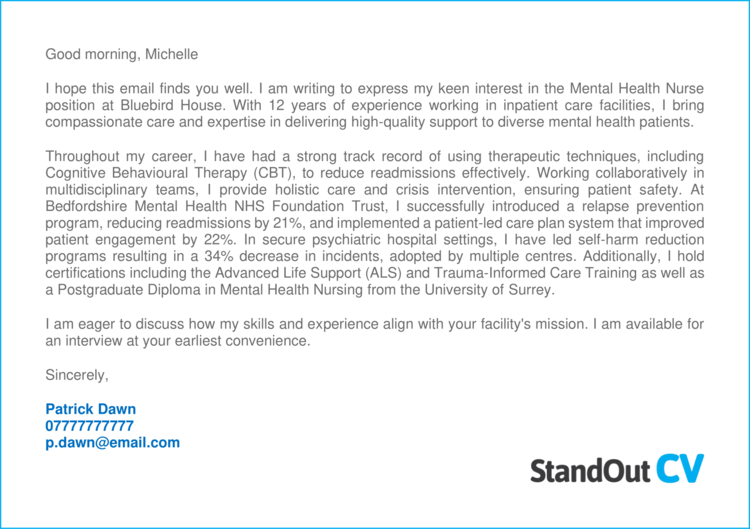
Nurse cover letter example 2
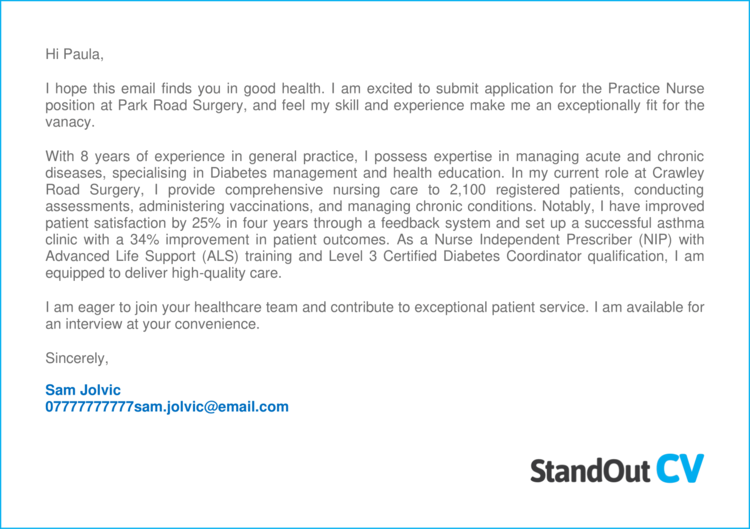
Nurse cover letter example 3
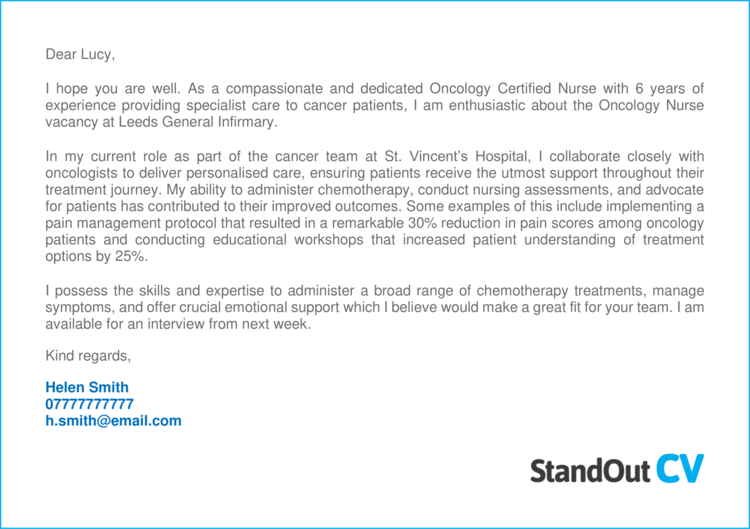
The Nurse cover letter examples above should give you a good idea of the type of content you need to include in your own cover letter, and how it should be structured.
But if you’re really looking to wow recruiters and get your CV in front of the very best employers, then check out our guidance on how to write your own effective cover letter below.
How to write a Nurse cover letter
Here’s how to write your own winning Nurse cover letter

Write your cover letter in the body of an email/message
When writing your Nurse cover letter, it’s best to type the content into the body of your email (or the job site messaging system) and not to attach the cover letter as a separate document.
This ensures that your cover letter gets seen as soon as a recruiter or employer opens your message.
If you attach the cover letter as a document, you’re making the reader go through an unnecessary step of opening the document before reading it.
If it’s in the body of the message itself, it will be seen instantly, which hugely increases the chances of it being read.

Start with a friendly greeting

Start you cover letter with a greeting that is professional but friendly.
This will build rapport with the recruiter whilst showing your professionalism.
- Hi, hope you’re well
- Hi [insert recruiter name]
- Hi [insert department/team name]
Avoid overly formal greetings like “Dear sir/madam ” unless applying to very traditional companies.
How to find the contact’s name?
Addressing the recruitment contact by name is an excellent way to start building a strong relationship. If it is not listed in the job advert, try these methods to find it.
- Check out the company website and look at their About page. If you see a hiring manager, HR person or internal recruiter, use their name. You could also try to figure out who would be your manager in the role and use their name.
- Head to LinkedIn , search for the company and scan through the list of employees. Most professionals are on LinkedIn these days, so this is a good bet.
Identify the role you are applying for
After you have greeted the recruiter, it’s important to state the job you are applying to.
Recruiters are often managing multiple vacancies, so they need to know exactly which job you are referring to.
Be as specific as possible and use a reference number if you can find one.
Here are some examples you can use;
- I am interested in applying for the role of admin assistant with your organisation.
- I would like to apply for the role of Sales assistant (Ref: 4057393)
- I would like to express my interest in the customer service vacancy within your retail department
- I saw your advertisement for a trainee project manager on Reed and would like to apply for the role.
See also: CV examples – how to write a CV – CV profiles
Highlight your suitability
The sole objective of your cover letter is to motivate recruiters into to opening your CV. And you achieve this by quickly explaining your suitability to the roles you are applying for.
Take a look at the job descriptions you are applying to, and make note of the most important skills and qualifications being asked for.
Then, when crafting your cover letter, make your suitability the central focus.
Explain why you are the best qualified candidate, and why you are so well suited to carry out the job.
This will give recruiters all the encouragement they need to open your CV and consider you for the job.

Keep it short and sharp
A good cover letter is short and sharp, getting to the point quickly with just enough information to grab the attention of recruiters.
Ideally your cover letter should be around 4-8 sentences long – anything longer will risk losing the attention of time-strapped recruiters and hiring managers .
Essentially you need to include just enough information to persuade the reader to open up your CV, where the in-depth details will sit.
Sign off professionally
To round of your cover letter, add a professional signature to the bottom, giving recruiters your vital contact information.
This not only gives various means of contacting you, it also looks really professional and shows that you know how to communicate in the workplace.
Include the following points;
- A friendly sign off – e.g. “Warm regards”
- Your full name
- Phone number (one you can answer quickly)
- Email address
- Profession title
- Professional social network – e.g. LinkedIn
Here is an example signature;
Warm regards,
Gerald Baker Senior Accountant 07887500404 [email protected] LinkedIn
Quick tip : To save yourself from having to write your signature every time you send a job application email, you can save it within your email drafts, or on a separate document that you could copy in.

What to include in your Nurse cover letter
Here’s what kind of content you should include in your Nurse cover letter…
The exact info will obviously depend on your industry and experience level, but these are the essentials.
- Your relevant experience – Where have you worked and what type of jobs have you held?
- Your qualifications – Let recruiters know about your highest level of qualification to show them you have the credentials for the job.
- The impact you have made – Show how your actions have made a positive impact on previous employers; perhaps you’ve saved them money or helped them to acquire new customers?
- Your reasons for moving – Hiring managers will want to know why you are leaving your current or previous role, so give them a brief explanation.
- Your availability – When can you start a new job ? Recruiters will want to know how soon they can get you on board.
Don’t forget to tailor these points to the requirements of the job advert for best results.
Nurse cover letter templates
Copy and paste these Nurse cover letter templates to get a head start on your own.
Good morning, Michelle
I hope this email finds you well. I am writing to express my keen interest in the Mental Health Nurse position at Bluebird House. With 12 years of experience working in inpatient care facilities, I bring compassionate care and expertise in delivering high-quality support to diverse mental health patients.
Throughout my career, I have had a strong track record of using therapeutic techniques, including Cognitive Behavioural Therapy (CBT), to reduce readmissions effectively. Working collaboratively in multidisciplinary teams, I provide holistic care and crisis intervention, ensuring patient safety. At Bedfordshire Mental Health NHS Foundation Trust, I successfully introduced a relapse prevention program, reducing readmissions by 21%, and implemented a patient-led care plan system that improved patient engagement by 22%. In secure psychiatric hospital settings, I have led self-harm reduction programs resulting in a 34% decrease in incidents, adopted by multiple centres. Additionally, I hold certifications including the Advanced Life Support (ALS) and Trauma-Informed Care Training as well as a Postgraduate Diploma in Mental Health Nursing from the University of Surrey.
I am eager to discuss how my skills and experience align with your facility’s mission. I am available for an interview at your earliest convenience.
Patrick Dawn
I hope this email finds you in good health. I am excited to submit application for the Practice Nurse position at Park Road Surgery, and feel my skill and experience make me an exceptionally fit for the vacancy.
With 8 years of experience in general practice, I possess expertise in managing acute and chronic diseases, specialising in Diabetes management and health education. In my current role at Crawley Road Surgery, I provide comprehensive nursing care to 2,100 registered patients, conducting assessments, administering vaccinations, and managing chronic conditions. Notably, I have improved patient satisfaction by 25% in four years through a feedback system and set up a successful asthma clinic with a 34% improvement in patient outcomes. As a Nurse Independent Prescriber (NIP) with Advanced Life Support (ALS) training and Level 3 Certified Diabetes Coordinator qualification, I am equipped to deliver high-quality care.
I am eager to join your healthcare team and contribute to exceptional patient service. I am available for an interview at your convenience.
I hope you are well. As a compassionate and dedicated Oncology Certified Nurse with 6 years of experience providing specialist care to cancer patients, I am enthusiastic about the Oncology Nurse vacancy at Leeds General Infirmary.
In my current role as part of the cancer team at St. Vincent’s Hospital, I collaborate closely with oncologists to deliver personalised care, ensuring patients receive the utmost support throughout their treatment journey. My ability to administer chemotherapy, conduct nursing assessments, and advocate for patients has contributed to their improved outcomes. Some examples of this include implementing a pain management protocol that resulted in a remarkable 30% reduction in pain scores among oncology patients and conducting educational workshops that increased patient understanding of treatment options by 25%.
I possess the skills and expertise to administer a broad range of chemotherapy treatments, manage symptoms, and offer crucial emotional support which I believe would make a great fit for your team. I am available for an interview from next week.
Kind regards,
Helen Smith
Writing an impressive cover letter is a crucial step in landing a Nurse job, so taking the time to perfect it is well worth while.
By following the tips and examples above you will be able to create an eye-catching cover letter that will wow recruiters and ensure your CV gets read – leading to more job interviews for you.
Good luck with your job search!
- See All Courses >
- SUCCESS STORIES
- GET YOUR FREE LINKEDIN HEADLINE SCORE >>
- GET YOUR FREE RESUME SCORE >>
- GENERATE YOUR JOB-WINNING COVER LETTER >>
- FIND ANY CONTACT’S EMAIL ADDRESS >>
- ResyMatch.io Scan and score your resume vs. any target job.
- ResyBuild.io Build a job-winning resume using proven templates and advice.
- CoverBuild.io Have AI generate a personalized, job-winning cover letter in
- HeadlineAnalyzer.io Transform your LinkedIn headline into a job-generating machine.
- ResyBullet.io Scan, score, and upgrade your resume bullets.
- Mailcoop.io Find anyone’s professional email address in seconds.
- The Job Search Email Playbook Our 100+ page guide to writing job-winning emails.
- Value Validation Project Starter Kit Everything you need to create a job-winning VVP.
- No Experience, No Problem Learn how to change careers with no experience.
- The Interview Preparation System A proven system for job-winning interview prep.
- The LinkedIn Launch Formula A proven system for six-figure success on LinkedIn.
- See All Blog Posts Check out all of our job search articles & posts.
- HeadlineAnalyzer.io Scan your LinkedIn Headline and turn it into a job-generating machine.
- LinkedIn Profile Optimization Our comprehensive guide to optimizing your LinkedIn profile.
- LinkedIn Headlines Learn how to write a crazy-effective LinkedIn headline.
- LinkedIn Profile Picture Learn how to create a job-winning LinkedIn profile picture.
- LinkedIn About Section Write a job-winning About section (with examples!)
- LinkedIn Cover Photos Learn how to create a job-winning LinkedIn cover photo.
- GET YOUR FREE LINKEDIN HEADLINE SCORE >>
- ResyMatch.io Scan your resume and turn it into a job-generating machine.
- ResyBuild.io Build a beautiful, job-winning resume using recruiter-approved templates.
- Resume Examples Check out example resumes for a range of job titles and industries.
- How To Write A Resume Learn how to write a resume that actually wins job offers.
- Resume Summaries Our guide on writing a job-winning resume summary.
- Resume Tips & Action Words 175+ tips & examples to supercharge your resume.
- GET YOUR FREE RESUME SCORE >>
- CoverBuild.io Use our tool to generate a personalized, job-winning cover letter in
- Cover Letter Examples Check out example cover letters for a range of job titles and industries.
- How To Write A Cover Letter Learn how to write a cover letter that actually wins job offers.
- Cover Letter Templates Check out our proven, job-winning cover letter templates.
- Addressing A Cover Letter Learn how to start a cover letter the right way.
- GENERATE YOUR JOB-WINNING COVER LETTER >>
- Mailscoop.io A tool to help you find anyone’s professional email in seconds.
- How To Get A Job Without Applying Online Our flagship guide for effective job searching in today’s market.
- How To Network Our comprehensive guide on learning how to network.
- Tips For Better Networking Emails 6 tips for writing networking emails that actually get results.
- What To Ask In An Informational Interview 10 great questions to ask during a networking conversation.
- FIND ANY CONTACT’S EMAIL ADDRESS >>
- How To Prepare For Interviews Our proven preparation framework for turning more interviews into offers.
- How To Create A Job-Winning Interview Presentation Learn our “silver bullet” Value Validation Project presentation strategy.
- Interview Questions & Answer Examples Job-winning example answers for common interview questions.
- What To Wear To An Interview A simple guide to dressing for the job you want.
- How To Write A Job-Winning Thank You Note Learn how to write a post-interview thank you that wins job offers.
Nursing Cover Letter Examples For 2024 (20+ Skills & Templates)
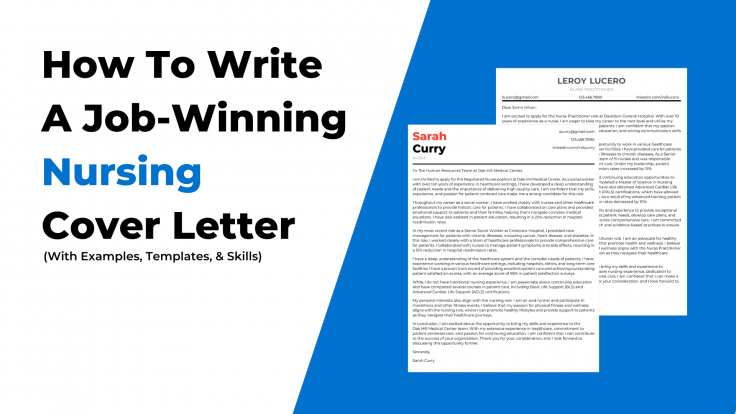
- Pinterest 0
Looking to land more nursing job offers?
Crafting a strong cover letter is key. This comprehensive guide is packed with everything you need to know in order to write a job-winning nursing cover letter , complete with effective strategies, essential skills, helpful templates, and real-life examples.
You can trust that all the insights and tips in this guide are based on data from coaching thousands of job seekers, just like you, who have gone on to secure positions at some of the world's most reputable companies.
Whether you're a seasoned nurse or just starting out, reading this guide from start to finish can help you land your dream role. But if you're short on time and looking for specific information, here's a breakdown of what's included:
- What To Know About Writing A Job-Winning Nursing Cover Letter
- The Best Skills To Include On A Nursing Cover Letter
How To Address A Nursing Cover Letter
- 3 Nursing Cover Letter Examples
The 8 Best Nursing Cover Letter Templates
3 tips for writing a job-winning nursing cover letter.
Here's the step-by-step breakdown:
Nursing Cover Letter Overview: What To Know To Write A Cover Letter That Wins More Job Offers
What do healthcare centers look for when hiring for a nursing role?
Hospitals and clinics look for nursing candidates with a nursing degree or diploma from an accredited program and a valid nursing license. Certification in a specialty area, such as pediatrics or critical care, may also be preferred.
Nurses should have both technical skills, such as administering medication and using medical equipment, and strong interpersonal skills, such as communication, empathy, and collaboration. They should be adaptable, flexible, able to make quick decisions, and solve problems in complex situations.
Professionalism and ethical standards are also important qualities in nursing roles. Nurses work as part of a larger healthcare team, so employers often look for candidates who are team players and can work effectively with others.
Your resume should show your potential employer that both your personality and your experience encompass all of these things.
Additionally, there are a few best practices you want to follow to write a job-winning nursing resume:
- Highlight your experience. Highlight your nursing experience that is most relevant to the job you are applying for. Focus on clinical skills, procedures, and technologies you are experienced with.
- Emphasize your communication and interpersonal skills. Provide examples of how you have effectively communicated with patients, family members, and colleagues.
- Include keywords from the job description: ensure your resume is optimized for applicant tracking systems (ATS).
- Highlight your problem-solving and decision-making skills. Provide examples of how you have addressed complex issues and made effective decisions.
- Include any relevant certifications, awards or professional development courses. List any nursing certifications, licenses, and professional memberships you hold.
- Quantify your work: Use numbers and statistics to quantify your achievements, such as the number of patients you cared for or the success rate of your treatments.
- Proofread: Make sure to thoroughly proofread your cover letter for any grammatical errors or typos. A well-written, error-free letter can make a strong first impression. I recommend using Hemingway App to do this.
Let's dive deeper into each of these so you have the exact blueprint you need to see success.
The Best Nursing Skills To Include On Your Cover Letter
Keywords are one of the most important factors in your cover letter. They show employers that your skills align with the role and they also help format your cover letter for Applicant Tracking Systems (ATS).
If you're not familiar with ATS systems, they are pieces of software used by employers to manage job applications. They scan cover letters for keywords and qualifications and make it easier for the employers to filter and search for candidates whose qualifications match the role.
If you want to win more nursing interviews and job offers, you need to have a keyword-optimized cover letter. There are two ways to find the right keywords:
1. Leverage The 20 Best Nursing Keywords
The first way to find the right keywords is to leverage our list of the best keywords and skills for a nursing cover letter.
These keywords were selected from an analysis of real nursing job descriptions sourced from actual job boards. Here they are:
- Patient Care
- Communication
- Collaboration
- Team Member
- Coordination
- Instruction
- Flexibility
- Certification
- Accountability
2. Use ResyMatch.io To Find The Best Keywords That Are Specific To Your Cover Letter And Target Role
The second method is the one I recommend because it's personalized to your specific cover letter and target job.
This process lets you find the exact keywords that your cover letter is missing when compared to the individual role you're applying for.
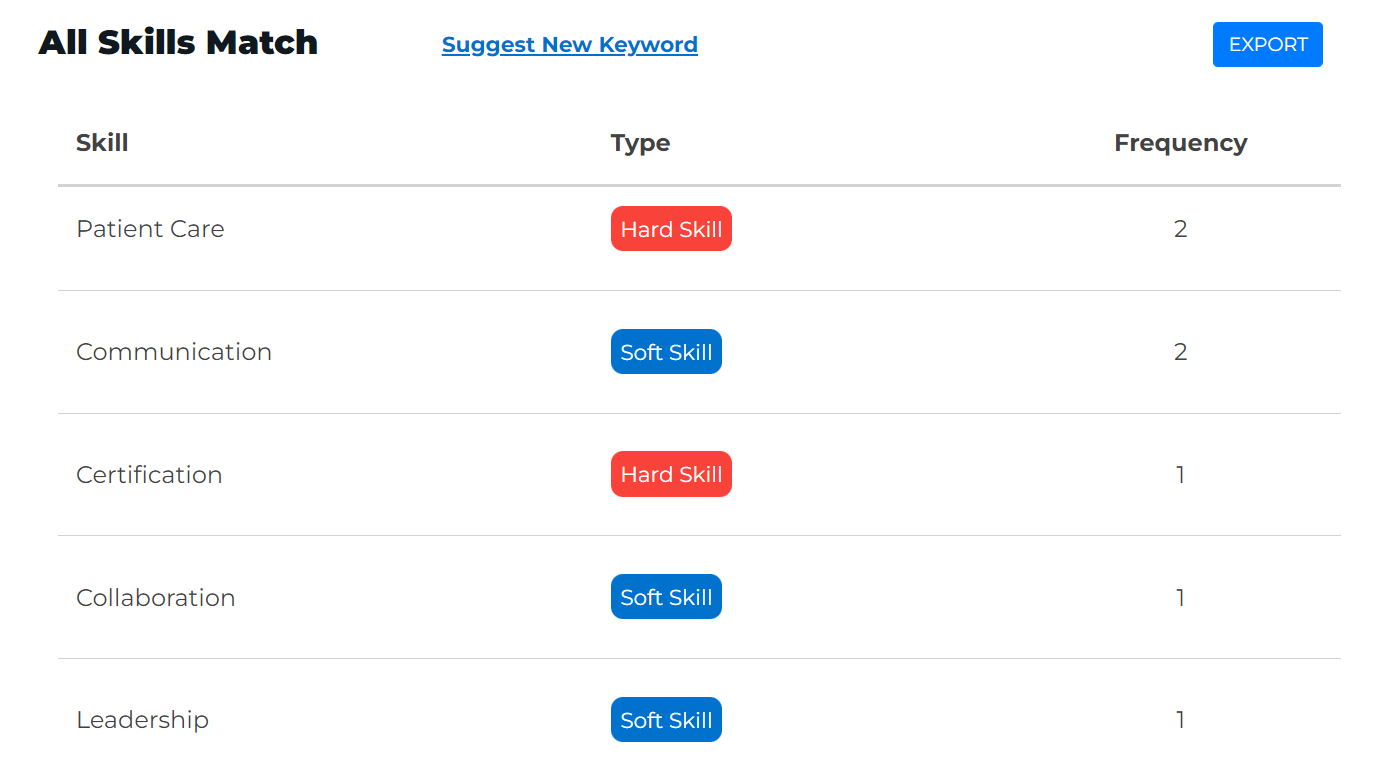
Here's how it works:
- Open a copy of your target nursing job description
- Head over to ResyMatch.io
- Select the “Job Description Scan” from the scan type selector in the upper right corner of the tool
- Copy and paste the nursing job description into the field on the left
- Hit scan and review the results
ResyMatch is going to scan the target job description and show you the exact keywords and skills that are relevant for the role and that you should weave into your cover letter.
Here's a video walking through this whole process:
Personalization is what makes a cover letter stand out. That starts from the very first sentence where you greet the person reading your cover letter! There are two ways to do this well:
1. Use The Hiring Manager's Name
The first, and best, is by including the hiring manager's name. Let's say that you discovered the hiring manager's name from a post on LinkedIn or via an informational interview.
This is the jackpot! All you need to do is use their name in the introduction, like this:

2. Use This Formula: To The [Department] Team at [Organization]
If you don't have the hiring manager's name, no problem! You can address your cover letter to the team that you're applying to.
For example, if you're applying to for a Product Marketing Manager role at Discovery Education, you might start you cover letter like this:
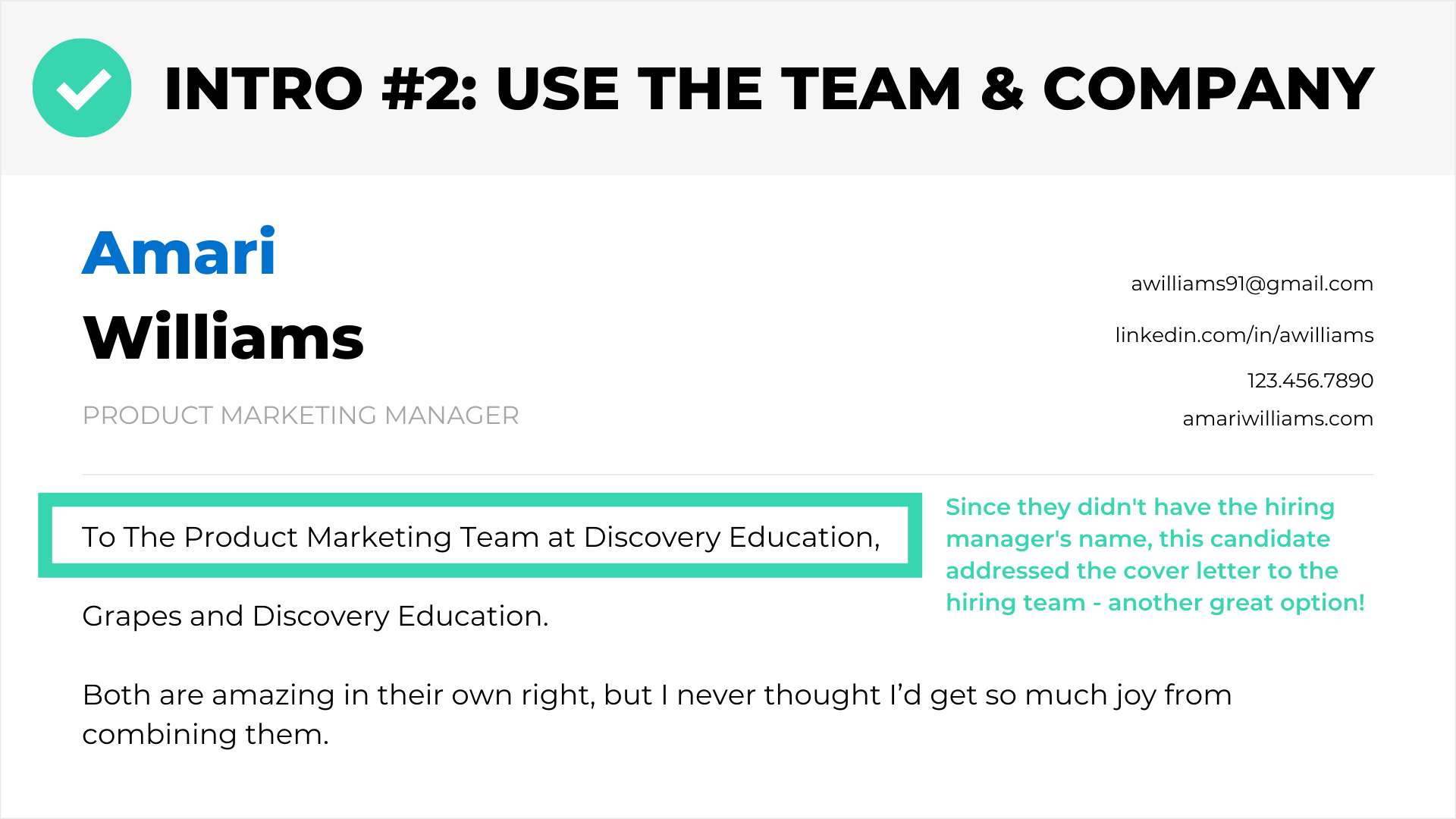
This shows the reader that this letter has been written specifically for them and the content inside of it will support that.
It's much more relevant and personal than “To Whom It May Concern!”
For more advice on writing a strong opening to your cover letter, check out this guide.
3 Nursing Cover Letter Examples For 2023
Now let's take a look at all of these best practices in action. Here are three cover letter examples for different situations from people with different backgrounds that are all applying for nursing roles:
Nursing Cover Letter Example #1: A Traditional Background
Our first example is a cover letter written by a candidate with traditional nursing experience. Here is what an example of their cover letter might look like:
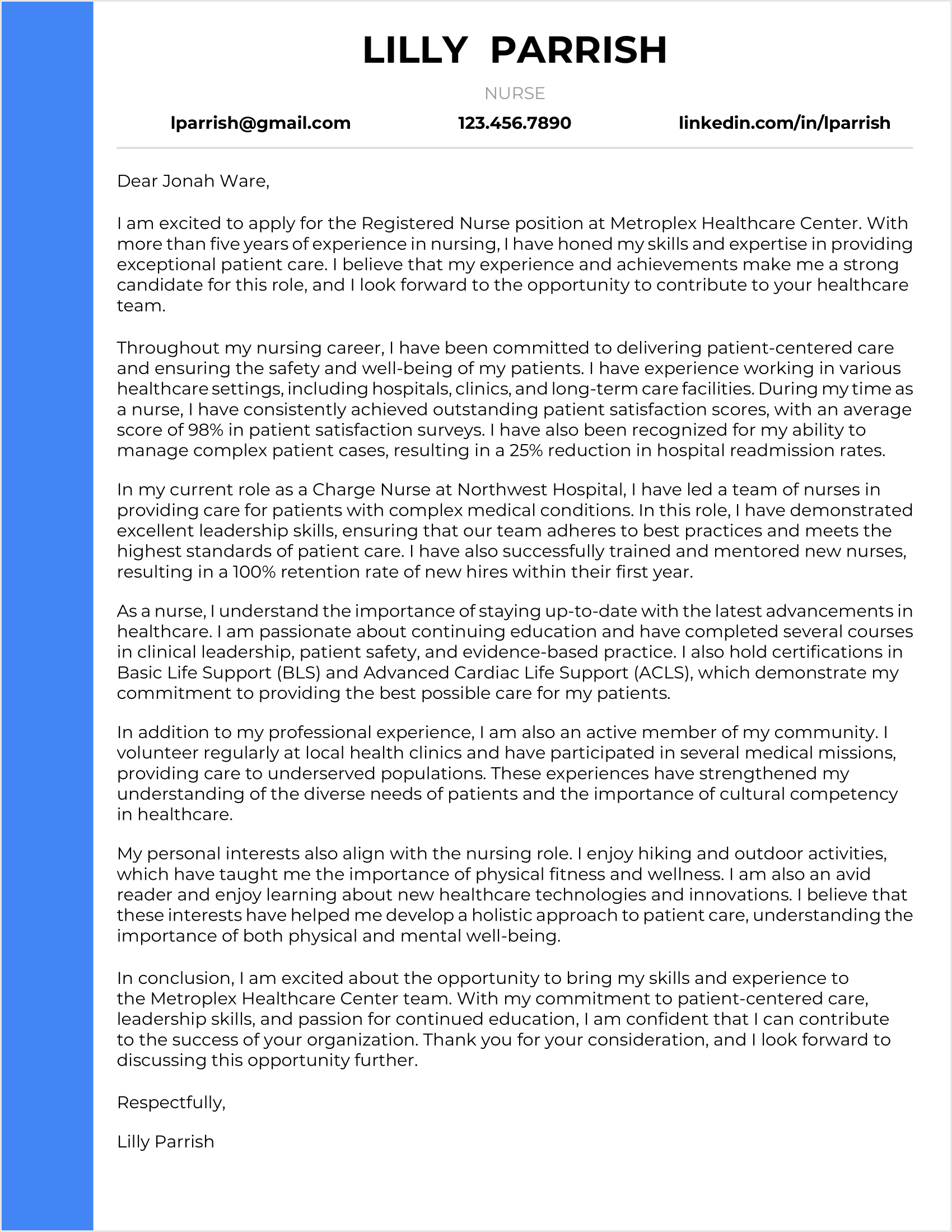
Nursing Cover Letter Example #2: A Non-Traditional Background
Our second cover letter example comes from a candidate looking to transition from a social work background into a nursing role. This cover letter illustrates how they identify and speak to their transferable skills:
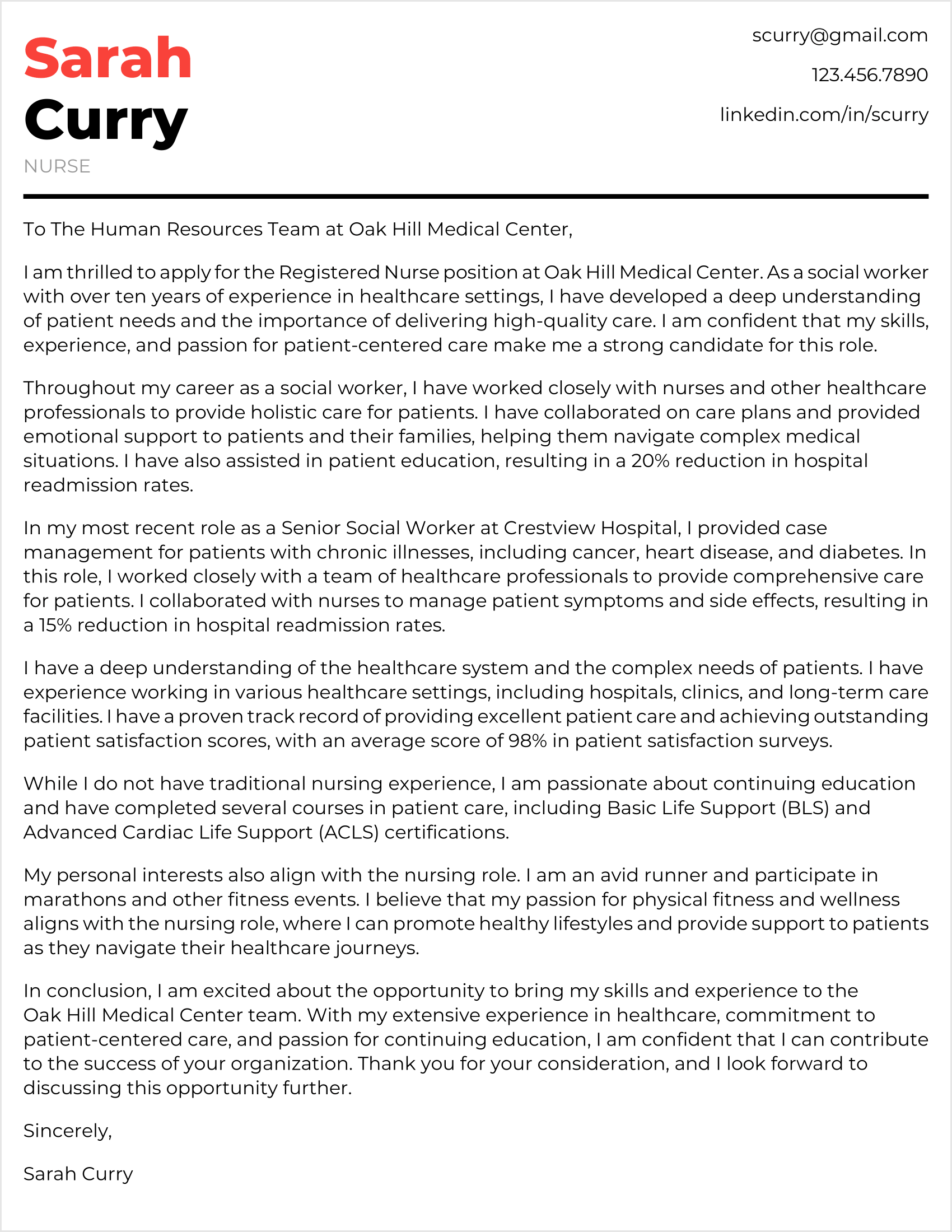
Nursing Cover Letter Example #3: Landing A Nurse Practitioner Role
Our third example highlights a candidate with extensive nursing experience who is looking to take a leap in their career and land a Nurse Practitioner role.
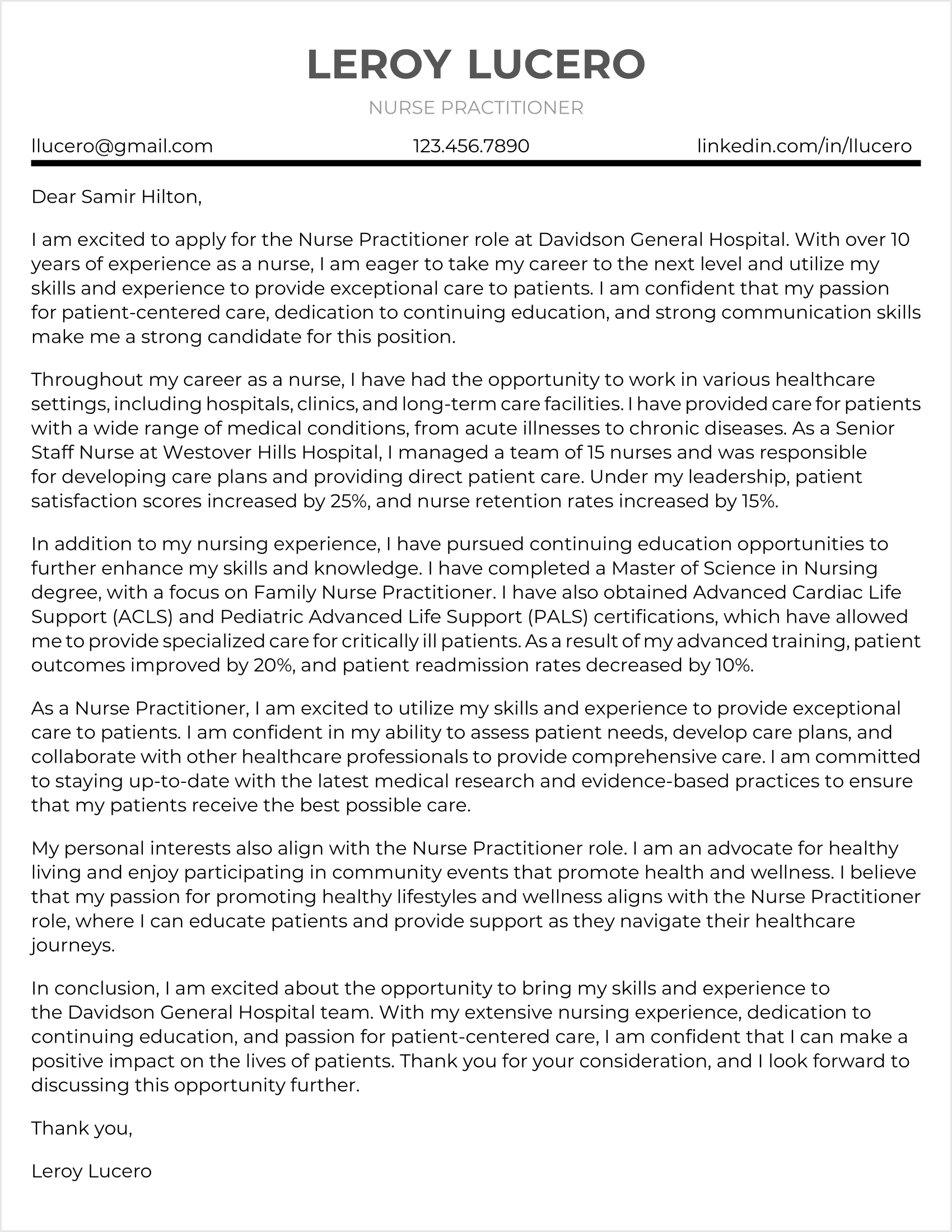
At this point, you know all of the basics you'll need to write a nursing cover letter that wins you more interviews and offers. The only thing left is to take all of that information and apply it to a template that's going to help you get results.
We made that easy with our CoverBuild tool . It has 8 proven templates that were created with the help of recruiters and hiring managers at the world's best companies. These templates also bake in thousands of data points we have from the job seekers in our audience who have used them to land job offers.
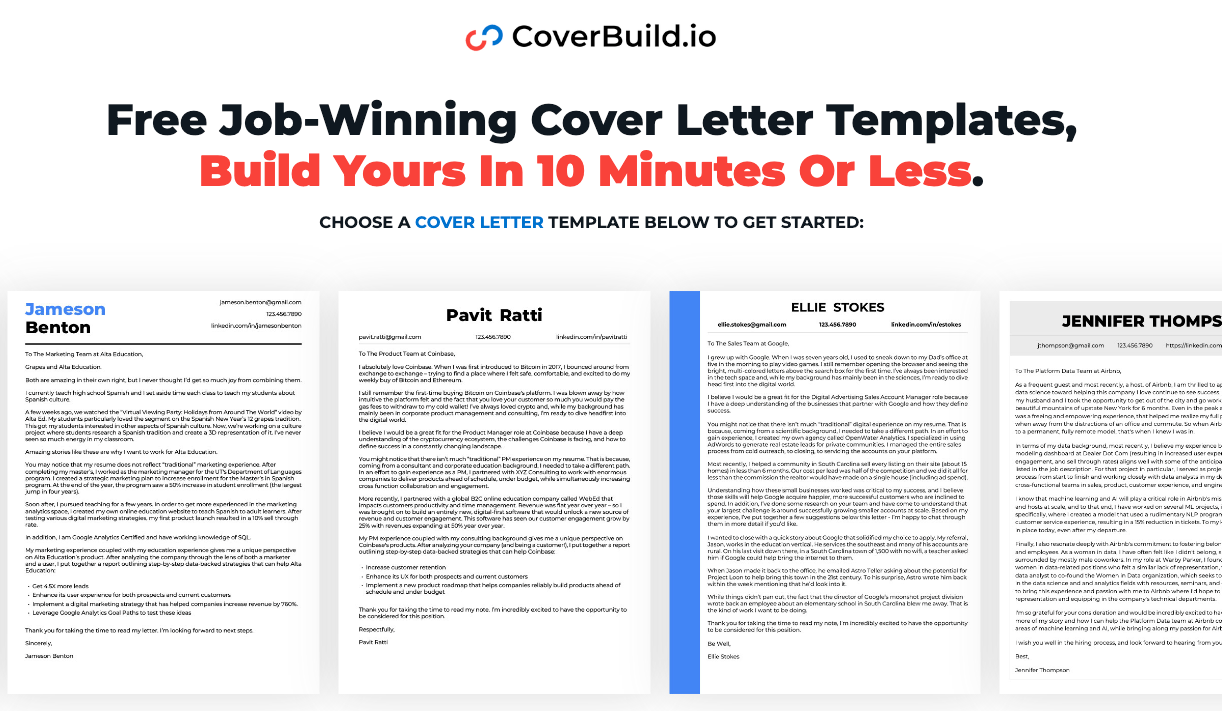
You're off to a strong start! But I've got a few more tips to help you take your cover letter to the next level:
1. Use ChatGPT To Write Your Cover Letter In <30 Seconds
All of these tips and best practices work, but you still have to implement them. Normally, that'd mean you sitting down and spending hours brainstorming ideas, typing, deleting, and typing again, and then feeling absolutely drained.
Now there's a way to work around all of that so you save your best energy for the writing and edits that matter most. Here's how it works:
- Head to ChatGPT (you'll need to create an account – it's free)
- Ask ChatGPT, “Please write me a cover letter for a nursing role. The role I'm applying for is [Job Title] role at [Employer]. Here is the job description: [Paste Job Description]. And here is my resume: [Paste Resume].
- Watch ChatGPT write up a pretty darn good cover letter base!
Here's a video of me doing this with a real cover letter if you want to see the steps in action:
Note: I do not recommend or advise that you simply copy and paste the content from ChatGPT into your cover letter and submit your application. ChatGPT is great for doing 80% of the baseline work, but you still need to review, revise, and personalize the content yourself.
2. Include Measurable Metrics And Outcomes
Too many job seekers only focus on the actions that they took and not the outcomes that resulted from those actions. As a hiring manager, it's impossible to differentiate between a dozen candidates who were all “Responsible For Monitoring Patient Progress.”
If you want to win, your cover letter should speak to the specific outcomes that you drove in previous roles. That could be:
- The percentage by which your patients' health improved under your care
- The average reduction in hospital readmissions
- The average parent satisfaction rate
- The rate by which you and your team were able to reduce medical errors
These numbers will show hiring teams what you're capable of and make your value crystal clear!
3. Match Your Cover Letter And Resume Design

They're the exact same car, down to the year, make, and model. The only difference is the way the product was presented. Like I said, quality impacts perceived value.
One of the best ways to boost the quality of your cover letter is to make it look clean, professional, and have it match your resume. That's why the resume templates in our resume builder tool match the cover letter templates in our cover letter builder:
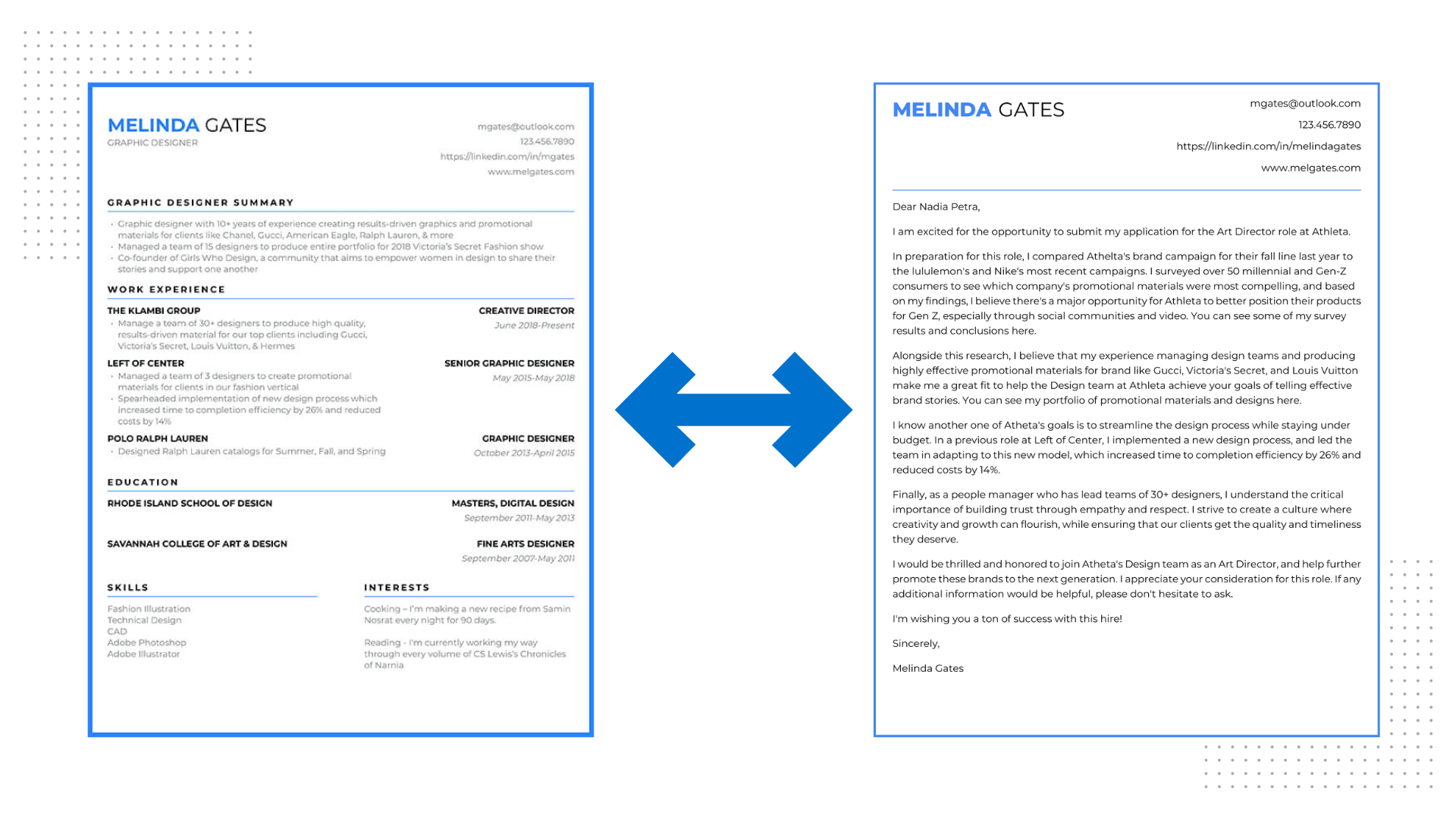
If you use both tools to create your cover letter and your resume, your entire application is going to be top notch.
Key Takeaways To Wrap Up Your Job-Winning Cover Letter
You made it! We packed a lot of information into this post so I wanted to distill the key points for you and lay out next steps so you know exactly where to from here.
Here are the 5 steps for writing a job-winning nursing cover letter:
- Start with a proven cover letter template from CoverBuild.io
- Use ResyMatch.io to find the right keywords and optimize your cover letter for each nursing role you apply to
- Start your nursing cover letter with a personalized greeting for the hiring manager or Human Resources representative.
- Emphasize the measurable outcomes and value you drove in previous roles (include metrics!)
- Compare the draft of your nursing cover letter to the examples on this page to make sure you're on the right path
- Use a tool like Hemingway App to proofread your cover letter before you submit it
If you follow those steps, you're going to be well on your way to landing more nursing interviews and job offers.
Now that your cover letter is taking care of, be sure to check out our guide on writing a job-winning Nursing resume (with examples!)

Laura Lorta
Laura is an Editor at Cultivated Culture. She transitioned from teaching into the world of content so she's no stranger to career pivots. She also has a bachelors in Entrepreneurship and a Masters in Curriculum & Instruction / Bilingual Education. She currently shares job search advice to help people like you land jobs they love without applying online.
LEAVE A REPLY Cancel reply
You must be logged in to post a comment.
Most Popular Posts

YOU’VE SEEN AUSTIN IN

WHAT CAN I HELP WITH?

Welcome Back To Cultivated Culture!
Log into your Cultivated Culture account using one of the options below:
Forgot your password? Click here to reset.
Need a free acount? Click Here To Sign Up
By logging in, you agree to Cultivated Culture's Terms of Use , Privacy Policy , and agree to receive email updates.
One Free Account, Four Job-Winning Tools
Sign up for a free Cultivated Culture account and get access to all of our job search tools:
Your Bullet Score is:
Sign up for a free Cultivated Culture account to get the full breakdown of your bullet along with suggestions for improving it:
Sign Up To Save & Export Your Resume
Sign up to create, save, and export your resume and get access to our suite of job search tools!
Sign Up To Get More Free Email Searches
Create a free account to unlock more email searches and get access to all four of our job-winning tools:
Your Headline Score is:
Sign up for a free Cultivated Culture account to get the full breakdown of your headline along with suggestions for improving it:
Already have an acount? Click Here To Log In
We Just Need You To Verify Your Email.
We just emailed you a 6-digit code. Please check your email and enter it below.
Note: Your progress will not be saved until your email is verified. Closing this pop up or window might cause you to lose your progress.
Invalid Code
Choose one of the options below to get the verification code we sent you!
We'll need you to verify your email address before you're able to unlock free scans.
We'll need you to verify your email address before you're able to unlock free templates, saves, and exports.
We'll need you to verify your email address before you're able to unlock free email searches.
We sent a verification code to your email, all you have to do is paste that code here and submit to get full access!
Looks Like You Still Need To Verify Your Email Address!
Whoops! Looks like you still haven't verified your email address. We'll need you to do that before granting free, unlimited access to our tools.
If you can't find the original verification email, click the link below and we'll send a new one:
Sent! Please check your email.
Oops you've hit your credit limit..
Looks like you've used all 10 of your free credits for the month. Your credit limit will refresh in days. You can learn more about your credit limit here.
Want to stop worrying about credits?
Sign up for our Unlimited plan to get instance unlimited access to all of our jon search tools for one low price. Click below to learn more:
Go Unlimited!
Change plan.
Upgrade your plan to get unlimited access to all 5 of our offer-winning job search tools and 200 email searches / week:
Go Unlimited (& Save 10%)!
Upgrade to get unlimited access to our resume tools, 200 email searches / week, and 10% off our regular pricing thanks to your friend :
Your Unlimited plan comes with...
Unlimited access to all 5 of our resume tools
200 Mailscoop searches per week
No obligations - cancel any time
By clicking "Upgrade My Plan," you agree to Cultivated Culture's Terms of Service and Privacy Policy
By clicking "Change Plan," you agree to Cultivated Culture's Terms of Service and Privacy Policy
Confirm Your Plan Change
Here is a summary of your plan change:
Current Plan:
Please note the following for plan changes:
Your new plan and rebill date will be effective immediately
The number above depict retail plan pricing, any adjustments or credits will be available in the Invoices section of your Billing tab
If you're moving to a lower cost plan, the difference will be credited to your account and applied towards your next payment
By clicking "Confirm Plan Change," you agree to Cultivated Culture's Terms of Service and Privacy Policy
Unlimited Plan Upgrade
Change payment method.
Promo code has been applied to your purchase!
Note: This is a monthly subscription, your card will be automatically charged every month until you cancel your plan.
Terms of Use | Privacy Policy
(C) 2024 Cultivated Culture
Note: You will not be charged for updating your credit card using this form. After your new card is added, you will be billed on the date of your next billing cycle.
Upgrade Complete!
You are officially a
Unlimited Member
Invoice Details
Paid Today:
Start Date:
Subscription:
Next Bill Date (Est.):
Note: This receipt and future invoices will be available in the Billing Tab of your Account Dashboard .

Do You Want To Secure Your Account?
Increase your account security with one of our multi-factor authentication options:
Choose An Authentication Method
Awesome! Let's make your account more secure.
Choose your preferred authentication method:
Text Message Authentication
Enter the phone number that you want to use to set up text-based authentication for your account:
Text Message Verification Code Sent!
Please check your phone for verification code and enter below:
Email Verification Code Sent!
Please check your email for verification code and enter below:
No problem, we'll skip this for now. Do you want us to remind you to secure your account?
6 New Grad Nurse Cover Letter Examples + How To Write

Finding your first nursing position after graduation can be a daunting task. Knowing what steps to take to find your dream job will help propel you toward your goal of gainful employment as an RN. Once you have prepared an excellent resume, be aware that you have one final action to take in the application process; that of a persuasive cover letter. You may be unclear about how to write an exceptional cover letter and wonder what are some excellent examples of new grad cover letters? Using a professionally prepared cover letter as a guide is a great way to learn how to compose a top-notch document. Read the following article “6 best new grad nurse cover letter examples + how to write” for recommendations that will help you get started on your best ever nursing cover letter without stress.
What Exactly Is A New Grad Nurse Cover Letter?
How is a new grad nurse cover letter different from an experienced nurse cover letter, 4 reasons why an excellent cover letter makes a difference to new grad nurses, 1. nurses are professional-, 2. leads to an interview-, 3. expands on resume-, 4. you may be up against experienced nurses-, what are some excellent examples of new grad nurse cover letters, example #1: cover letter of diane joyner, what makes this an excellent new grad registered nurse cover letter:, example #2: cover letter of jan bock, example #3: cover letter of joan zimmerman, example #4: cover letter of lizzie arndt, what makes this an excellent new grad registered nurse cover letter: new grad nurse cover letter examples, example #5: cover letter of lynn horton, example #6: cover letter of paul linney, how to write an excellent new grad rn cover letter, 1. heading-.
• Your Name and Contact Information • The date • The recipient's name and address
2. Opening Paragraph-
• Your professional credentials (RN or BSN) • Which specific job you are applying for • A few brief points about why you are a great fit • Why you want to work for this particular institution or position
3. Background-
4. qualifications-.
• Specific clinical experience • Other job or volunteer transferable experience • " Soft skills " such as communication, leadership, group experience, compassion, and problem-solving
5. Closing Paragraph and Sign-Off-
6. don't just reiterate your resume-, 7. outshine with your willingness to learn-, 8. detail why you want the job-, 9. showcase your exceptional side-, 10. fashion the letter to the exact position-, 11. show your passion-.
• Adaptability • Ease with technology • Willing to accept change • Eager and positive attitude • Fresh perspective
12. Proof Read-
7 common mistakes to avoid when writing your new grad nurse cover letter, 1. too general-, 2. improper format-, 3. too wordy-, 4. duplicate resume-, 5. not selling yourself to the job-, 6. too informal-, 7. spelling and grammar errors-, 3 consequences of a poorly written new grad rn cover letter, 1. you may not be granted an interview-, 2. you may misrepresent yourself-, 3. compensation and opportunities may be compromised-, my final thoughts, frequently asked questions answered by our expert, 1. what is the difference between new grad nurse cover letter and new grad nurse cv, 2. is a cover letter necessary for a new grad nurse, 3. can i use the same cover letter for all new grad nurse positions i'm applying for, 4. how many cover letters do i need when applying for new grad nurse job positions, 5. can my new grad nurse cover letter expire, 6. my new grad nurse job applications says a cover letter is optional, should i still submit one, 7. do cover letters for new grad nurses have to be long, 8. as a new grad nurse, when should i write my cover letter, 9. what should be included in a new grad nursing cover letter.
• Heading • Salutation • Opening paragraph of who you are and your intentions for which specific job • Background paragraph, where you highlight your education and clinical experience • Qualification paragraph, which is used to “sell” the employer on your qualities and abilities as a nurse • Closing paragraph and sign-off
10. What Should Not Be Included In A New Grad Nursing Cover Letter?
11. how much time does it take to write a cover letter for a new grad nurse, 12. can i ask someone else to write my new grad nurse cover letter, 13. is it a good idea to use ready templates to write my new grad nurse cover letter, 14. are there any online apps or tools that make writing a good cover letter for a new grad nurse easy.

How to Write a New Grad Nurse Cover Letter (With Examples!)
What is a new grad nurse cover letter.
- Cover Letter Benefits
- New Grad Nurse Cover Letter Features
- What to Include

First, congratulations on graduating from nursing school! This is a huge milestone that paves the way for an exciting and fulfilling career in the nursing profession. As you embark on this next chapter, it's time to polish your new grad nurse resume and craft a captivating new grad nurse cover letter that truly shines.
If you are a recent nursing school graduate, you are in the right place! This article will explain what a new nurse cover letter is, how they are unique from other cover letters, what they should include, and four sample new grad nurse cover letters.
A new grad nurse cover letter is the document that will accompany your resume when applying for a nursing position or nurse residency program as a new grad nurse.
It serves as an introduction to the hiring manager and provides an opportunity to highlight your qualifications, skills, and passion for nursing.
Most importantly, cover letters also allow you to make a positive first impression. A well-written cover letter helps grab the hiring manager's attention and makes them interested in reviewing your resume and considering you for the position.

By clicking download, you agree to receive email newsletters and special offers from Nurse.org. You may unsubscribe at any time by using the unsubscribe link, found at the bottom of every email.
Your request has been received. Thanks!
Do You Need a Cover Letter When Applying to Jobs as New Grad Nurse?
The short answer is yes, you do need one! Here are the top 3 reasons why new nurse grad cover letters are an essential component of a job application:
Personalization
A cover letter allows you to customize your application and tailor it to the specific nursing position you are applying for. You can highlight relevant skills, experiences, and qualifications that make you a strong candidate for that particular role.
Showcase Your Qualifications
A cover letter provides an opportunity to expand on the information provided in your resume.
You can elaborate on your educational background, clinical experiences, and any specialized training or certifications you have obtained. This helps the hiring manager understand your qualifications in more detail.
Express Your Passion For Nursing
A cover letter allows you to convey your passion for nursing and express why you are motivated to pursue a career in this field. It helps the hiring manager gauge your enthusiasm and commitment to the profession.
Stand Out From Your Competition
A cover letter gives you the opportunity to differentiate yourself from other candidates. By highlighting your unique experiences, skills, and qualifications, you can make a compelling case for why you are the best fit for the position.
>> Show Me Online MSN Programs
How is a New Grad Nurse Cover Letter Unique from Other Cover Letters?
A new grad nurse cover letter is different from other cover letters because the context is very specific to newly graduated nurses entering the workforce. Here are some unique aspects:
Nursing Education
As a new graduate nurse, your educational background is a critical component of your qualifications.
Your cover letter will likely place significant emphasis on your nursing education, including the nursing program you completed, and any relevant coursework or clinical rotations.
If you graduated with honors, this is a great place to emphasize it!
Limited Professional Experience Compared to Experienced RNs
Unlike experienced nurses, new grad nurses have limited professional experience. Therefore, the focus of your cover letter will often be on your clinical experiences during your nursing program, including any internships, externships, or practical training.
You can highlight the skills, knowledge, and achievements gained during these experiences to demonstrate your readiness for the job.
Demonstrate Enthusiasm and Eagerness to Learn
As a new graduate, employers understand that you are entering the nursing field with a strong foundation of theoretical knowledge but limited practical experience.
Your cover letter should convey your enthusiasm for learning and your eagerness to grow as a nurse. You can express your commitment to ongoing professional development, continuing education, and embracing mentorship opportunities.
What Should You Include in a New Grad Nurse Cover Letter?
When crafting a New Grad Nurse Cover Letter, you should include the following sections, each serving a specific purpose:
1. Personal and Contact Information
Include your full name, address, phone number, and email address at the top of the cover letter. This information allows the hiring manager to easily reach out to you.
2. Greeting
Address the cover letter to the hiring manager or the person responsible for reviewing applications.
If the job posting does not mention a specific name, you can address it as "Dear Hiring Manager" or "Dear [Name of the Healthcare Organization] Hiring Team."
To find the appropriate contact information, you can search the organization's website and LinkedIn profiles of employees, or consider making a phone call to the organization's human resources department.
3. Opening Paragraph
In the opening paragraph, introduce yourself as a recent nursing graduate and express your interest in the specific nursing position you are applying for.
Mention how you learned about the job opening, whether through a job posting, referral, or research on the organization.
4. Middle Paragraph(s):
In the middle paragraph(s), elaborate on your qualifications, skills, and experiences.
Highlight your nursing education, including the name of the nursing program, the degree obtained, and the date of graduation. Mention any honors, awards, or notable achievements during your studies.
Discuss your clinical experiences, such as internships or practical training, and emphasize the types of patients you worked with, the skills you gained, and any noteworthy contributions or accomplishments.
Additionally, highlight any relevant transferable skills from other experiences, such as leadership roles, volunteer work, or part-time jobs. These skills can include communication, teamwork, critical thinking, organization, and problem-solving.
5. Closing Paragraph
In the closing paragraph, reiterate your interest in the position and express gratitude for the opportunity to apply.
Emphasize your enthusiasm for further discussing your qualifications in an interview.
You can mention that you are open to providing any additional information or references upon request.
6. Sign Off
End the cover letter with a professional sign-off, such as "Sincerely," followed by your full name.
Leave space for your handwritten signature if you are submitting a physical copy of the letter.
Nursing Cover Letter Tips for New Grads
Remember to keep your cover letter concise and focused, typically no longer than one page.
Customize it for each job application, aligning your qualifications and experiences with the specific requirements of the position.
Proofread the letter carefully to ensure it is free from errors and presents a professional image.
4 Nurse Cover Letter Examples for New Grads
Here are four nurse cover letter examples tailored to different scenarios for new grad nurses:
Example #1: New Grad Nurse Applying to a Med Surg Unit
Dear (Recipient's Name),
I am writing to express my strong interest in the New Grad Nurse position within the Medical-Surgical Unit at (Healthcare Organization). As a recent graduate of (Nursing Program) with a passion for patient care and a solid foundation in medical-surgical nursing, I am excited to contribute to your dedicated team.
During my nursing education at (Nursing Program), I developed a comprehensive understanding of medical-surgical nursing principles and gained valuable clinical experience. I successfully completed rotations in diverse healthcare settings, including medical-surgical units, where I had the opportunity to care for patients with a wide range of conditions and diagnoses. My clinical experiences helped equip me with strong assessment skills, the ability to administer medications safely, and effective communication with interdisciplinary teams.
I am confident in my ability to provide exceptional care to patients in the Medical-Surgical Unit at (Healthcare Organization). I am committed to delivering compassionate, patient-centered care and ensuring the highest standard of safety and quality.
I am impressed by (healthcare Organization’s) reputation for excellence in medical-surgical care and your commitment to fostering a collaborative and supportive work environment. I am eager to join your team and contribute to the delivery of outstanding patient outcomes.
Thank you for considering my application. I would welcome the opportunity to discuss how my skills and passion for medical-surgical nursing align with the needs of (Healthcare Organization) in an interview. Please find my attached resume for your review. I look forward to hearing from you.
(Your Full Name)
Example #2: New Grad Nurse Applying to a Labor and Delivery Unit
I am thrilled to apply for the New Grad Nurse position within the Labor and Delivery Unit at (Healthcare Organization). As a recent graduate of (Nursing Program), I am excited to embark on a fulfilling career in maternal-child health and contribute to the exceptional care provided by your renowned department.
Throughout my nursing education, I developed a strong passion for women's health and had the privilege of completing a clinical rotation in the Labor and Delivery Unit at (Hospital Name). This experience provided me with hands-on exposure to the full spectrum of obstetric care, including antepartum, intrapartum, and postpartum stages. I gained valuable skills in fetal monitoring, assisting with labor and delivery, conducting newborn assessments, and providing breastfeeding support.
My dedication to providing compassionate care to women and their families is unwavering. I possess excellent communication skills, which allow me to establish trusting relationships with patients, address their concerns, and provide education during pivotal moments. I am confident in my ability to promote a safe and nurturing environment for both mothers and infants, ensuring positive birth experiences and healthy outcomes.
The commitment to excellence and family-centered care at (Healthcare Organization) aligns perfectly with my professional values. Joining your Labor and Delivery Unit would allow me to contribute my knowledge and skills while continuously growing and learning as a nurse.
Thank you for considering my application. I am excited about the opportunity to discuss further how my passion for maternal-child health and my dedication to providing exceptional care align with the needs of (Healthcare Organization). Please find my attached resume for your review. I look forward to the possibility of an interview.
Example #3: New Grad Nurse Applying to the ICU
I am writing to express my interest in the New Grad Nurse position within the Intensive Care Unit at (Healthcare Organization). As a recent graduate of (Nursing Program), I am eager to embark on a challenging and rewarding career in critical care nursing and contribute to your esteemed department's mission of providing exceptional patient care.
During my nursing education, I had the privilege of completing a clinical rotation in the ICU at (Hospital Name). This invaluable experience exposed me to a wide array of critical care scenarios, including postoperative care, respiratory distress, and cardiovascular emergencies. I developed strong assessment skills and honed my ability to monitor and interpret vital signs.
My passion for critical care nursing is fueled by a commitment to deliver exemplary patient outcomes. I thrive in high-pressure situations, utilizing critical thinking and effective communication to collaborate with interdisciplinary teams and ensure prompt and precise interventions. I am eager to learn and become more proficient in advanced life support techniques, medication administration, and ventilator management to provide compassionate and evidence-based care to critically ill patients.
(Healthcare Organization)'s reputation for excellence in critical care and commitment to advancing patient care aligns perfectly with my professional aspirations. I am impressed by the innovative practices and ongoing professional development opportunities available within your organization.
Thank you for considering my application. I welcome the opportunity to discuss how my dedication, clinical competencies, and enthusiasm for critical care align with the needs of (Healthcare Organization). Please find my attached resume for your review. I am excited about the possibility of an interview and look forward to hearing from you.
Example #4: New Grad Nurse Applying to an Oncology Unit
I am writing to express my sincere interest in the New Grad Nurse Program within the Oncology Unit at (Healthcare Organization). As a recent graduate of (Nursing Program) with a strong passion for oncology nursing, I am eager to contribute to your dedicated team and provide compassionate care to individuals and families impacted by cancer.
Throughout my nursing education, I was deeply inspired by the strength and resilience of oncology patients I encountered during my clinical rotations. I gained exposure to various aspects of oncology care, including chemotherapy administration, symptom management, patient education, and palliative care.
I am committed to providing holistic support to patients throughout their cancer journey. I possess excellent communication skills, enabling me to establish trusting relationships, listen attentively to patients' concerns, and provide emotional support. I am dedicated to staying updated on advancements in oncology treatments and nursing interventions to ensure the highest standard of care.
(Healthcare Organization)'s reputation as a leading provider of oncology services, along with your comprehensive and patient-focused approach aligns with my professional goals. Participating in your New Grad Nurse Program would provide an ideal platform to enhance my skills, expand my knowledge, and contribute to the well-being of oncology patients.
Thank you for considering my application. I welcome the opportunity to discuss my passion for oncology nursing, and dedication to patient care. Please find my attached resume for your review. I am excited about the possibility of an interview and look forward to hearing from you.
A well-crafted new grad nurse cover letter is a valuable tool for showcasing your qualifications, skills, and passion for nursing. It allows you to personalize your application and stand out from other candidates, despite limited professional experience.
By highlighting your education, clinical experiences, transferable skills, and career goals, you can highlight your readiness and commitment to excel as a new graduate nurse.
Remember, landing your first nursing position may take time and perseverance. But with a well-crafted cover letter, a compelling resume, and a great attitude, you will land your first nursing job. Good luck in your job search as you embark on this fulfilling and rewarding journey as a new grad nurse!

Sarah Jividen , RN, BSN, is a trained neuro/trauma and emergency room nurse turned freelance healthcare writer/editor. As a journalism major, she combined her love for writing with her passion for high-level patient care. Sarah is the creator of Health Writing Solutions , LLC, specializing in writing about healthcare topics, including health journalism, education, and evidence-based health and wellness trends. She lives in Northern California with her husband and two children.

Plus, get exclusive access to discounts for nurses, stay informed on the latest nurse news, and learn how to take the next steps in your career.
By clicking “Join Now”, you agree to receive email newsletters and special offers from Nurse.org. We will not sell or distribute your email address to any third party, and you may unsubscribe at any time by using the unsubscribe link, found at the bottom of every email.

- Nurse Career

opens in a new window
How Nurses Can Address Employment Gaps
If you’re currently job hunting, you might be facing the task of addressing employment gaps in your resume. Whether you took time off to recharge from burnout , pursue further education opportunities, provide care for family members, or explore new career avenues, gaps can sometimes feel like stumbling blocks in your career journey. But fear not. There are plenty of effective strategies for tackling those tricky employment gaps in your nursing resume, as well as interview tips for highlighting your skills, experiences, and dedication to the nursing profession.
Understanding Employment Gaps
You may be nervous and dread the job search process if you have a gap in your work history. However, employment gaps are more common than you might think, and they don’t have to be a red flag for potential employers. In today’s job market, it’s become much more common to pivot and take time off from a traditional role. The top three reasons for temporarily leaving the workforce include family responsibilities, layoffs, and relocation.
Life happens, and taking time off for personal family reasons, further education, or exploring different career paths is completely normal. Nursing is a flexible field that provides many opportunities. Let’s explore ways to address these gaps proactively and strategically in your resume, cover letter, and during the interview process.
Strategies to Address Employment Gaps
Nurses can address employment gaps at multiple points in the job application process: the resume, cover letter, and interview.
Crafting a Nursing Resume
Your nursing resume is your ticket to getting in the door for an interview, so presenting your experiences and skills in the best light is crucial. When it comes to addressing employment gaps, honesty is the best policy. Be transparent about your career timeline. Your prospective employer will be able to verify start and stop dates so they can discover any dishonesty.
If possible, avoid a chronologically formatted resume, which may draw immediate attention to dates of employment. Consider using a functional resume format, which focuses on your experiences and skills rather than a traditional chronological employment order. This format allows you to visually highlight your strengths up front, drawing attention away from any breaks in your work history.
While you might not have been in a traditional bedside nursing role during your time off, there are plenty of opportunities for continued career development and skill enhancement outside of a paid job. Before applying for a new position, consider taking online courses, attending workshops, or participating in professional conferences related to your field. These activities keep your knowledge and skills up to date. They also demonstrate your dedication to your work as a nurse and provide some experiences for your resume.
Writing a Cover Letter
A cover letter allows you to introduce yourself and explain why you are a great fit for the job you seek. This opportunity is an excellent time to mention skills you’ve learned during your experiences away from traditional employment and how they apply to the work you wish to do.
For example, if you’ve stepped away from your career due to burnout, you may mention how you’ve realigned your experiences and how this time away has given you a drive to improve the patient experience. You may also bring up nonclinical work applicable to your nursing field.
Nursing Interview Tips
Your strong resume and cover letter got you in the door, and now you are preparing for an interview . While your prospective employer might not mention any employment gaps during the interview, it’s wise to be ready in case they ask how you spent your time away.
An interview is an excellent time to explain why you stepped away and what you learned while doing what was most important to you at that time. Remain confident! Avoid being defensive or apologetic about your reasons for leaving. Instead, focus on the skills and experiences you gained during that period. Frame your experiences during those gaps in a positive light, emphasizing what you learned and how it has contributed to your professional growth.
Include explanations about anything you did during the break pertinent to the job you’re applying for. For example, providing care for a sick loved one shows organization, care management, and nursing skills. Taking time off to raise children may have included volunteer work at a school, summer camp, or religious organization. Attending school provides knowledge and skill sets that can be used directly on the job and a degree or certification to back it up! For any reason that you stepped away, there is an applicable life or nursing skill you learned that will make you a better nurse.
Be sure to emphasize any specific volunteer work, professional continuing education , or certifications you obtained during your time away from traditional employment. These activities demonstrate your commitment to professional development and showcase your passion for nursing and patient care.
Networking to Your Advantage
Do not underestimate the power of professional networking in your job search. Reach out to former colleagues, professors, and other contacts to find potential opportunities. Networking can open doors to job markets you wouldn’t have considered otherwise. Additionally, your colleagues can provide valuable insights into how other nurses have successfully navigated going back to work after a pause.
Attending professional networking events like the Emergency Nurse’s Association Conference is another great way to address an employment gap. Not only will this put you in contact with other nurses in your field, but it will provide you with career development opportunities for your nursing resume.
Don’t Worry About Employment Gaps
Addressing employment gaps in your resume can feel like a daunting task, but with the right approach, you can turn those gaps into opportunities for personal growth and career development. Honesty, transparency, and a positive mindset are key to navigating this situation successfully. By crafting a strong nursing resume, focusing on career development opportunities, contacting your professional network, and using interview tips, you’ll be prepared to land your next nursing job with ease. Start your job search today!
Kate Houck, RN, BSN, is a L&D nurse with over nine years of experience in OB, lactation, school nursing, and pediatrics. She has a passion for taking care of families and helping new nurses be the best they can be.


How to Write a Cover Letter That Will Get You a Job
I ’ve read thousands, maybe tens of thousands, of cover letters in my career. If you’re thinking that sounds like really boring reading, you’re right. What I can tell you from enduring that experience is that most cover letters are terrible — and not only that, but squandered opportunities. When a cover letter is done well, it can significantly increase your chances of getting an interview, but the vast majority fail that test.
So let’s talk about how to do cover letters right.
First, understand the point of a cover letter.
The whole idea of a cover letter is that it can help the employer see you as more than just your résumé. Managers generally aren’t hiring based solely on your work history; your experience is crucial, yes, but they’re also looking for someone who will be easy to work with, shows good judgment, communicates well, possesses strong critical thinking skills and a drive to get things done, complements their current team, and all the other things you yourself probably want from your co-workers. It’s tough to learn much about those things from job history alone, and that’s where your cover letter comes in.
Because of that …
Whatever you do, don’t just summarize your résumé.
The No. 1 mistake people make with cover letters is that they simply use them to summarize their résumé. This makes no sense — hiring managers don’t need a summary of your résumé! It’s on the very next page! They’re about to see it as soon as they scroll down. And if you think about it, your entire application is only a few pages (in most cases, a one- or two-page résumé and a one-page cover letter) — why would you squander one of those pages by repeating the content of the others? And yet, probably 95 percent of the cover letters I see don’t add anything new beyond the résumé itself (and that’s a conservative estimate).
Instead, your cover letter should go beyond your work history to talk about things that make you especially well-suited for the job. For example, if you’re applying for an assistant job that requires being highly organized and you neurotically track your household finances in a detailed, color-coded spreadsheet, most hiring managers would love to know that because it says something about the kind of attention to detail you’d bring to the job. That’s not something you could put on your résumé, but it can go in your cover letter.
Or maybe your last boss told you that you were the most accurate data processor she’d ever seen, or came to rely on you as her go-to person whenever a lightning-fast rewrite was needed. Maybe your co-workers called you “the client whisperer” because of your skill in calming upset clients. Maybe you’re regularly sought out by more senior staff to help problem-solve, or you find immense satisfaction in bringing order to chaos. Those sorts of details illustrate what you bring to the job in a different way than your résumé does, and they belong in your cover letter.
If you’re still stumped, pretend you’re writing an email to a friend about why you’d be great at the job. You probably wouldn’t do that by stiffly reciting your work history, right? You’d talk about what you’re good at and how you’d approach the work. That’s what you want here.
You don’t need a creative opening line.
If you think you need to open the letter with something creative or catchy, I am here to tell you that you don’t. Just be simple and straightforward:
• “I’m writing to apply for your X position.”
• “I’d love to be considered for your X position.”
• “I’m interested in your X position because …”
• “I’m excited to apply for your X position.”
That’s it! Straightforward is fine — better, even, if the alternative is sounding like an aggressive salesperson.
Show, don’t tell.
A lot of cover letters assert that the person who wrote it would excel at the job or announce that the applicant is a skillful engineer or a great communicator or all sorts of other subjective superlatives. That’s wasted space — the hiring manager has no reason to believe it, and so many candidates claim those things about themselves that most managers ignore that sort of self-assessment entirely. So instead of simply declaring that you’re great at X (whatever X is), your letter should demonstrate that. And the way you do that is by describing accomplishments and experiences that illustrate it.
Here’s a concrete example taken from one extraordinarily effective cover-letter makeover that I saw. The candidate had originally written, “I offer exceptional attention to detail, highly developed communication skills, and a talent for managing complex projects with a demonstrated ability to prioritize and multitask.” That’s pretty boring and not especially convincing, right? (This is also exactly how most people’s cover letters read.)
In her revised version, she wrote this instead:
“In addition to being flexible and responsive, I’m also a fanatic for details — particularly when it comes to presentation. One of my recent projects involved coordinating a 200-page grant proposal: I proofed and edited the narratives provided by the division head, formatted spreadsheets, and generally made sure that every line was letter-perfect and that the entire finished product conformed to the specific guidelines of the RFP. (The result? A five-year, $1.5 million grant award.) I believe in applying this same level of attention to detail to tasks as visible as prepping the materials for a top-level meeting and as mundane as making sure the copier never runs out of paper.”
That second version is so much more compelling and interesting — and makes me believe that she really is great with details.
If there’s anything unusual or confusing about your candidacy, address it in the letter.
Your cover letter is your chance to provide context for things that otherwise might seem confusing or less than ideal to a hiring manager. For example, if you’re overqualified for the position but are excited about it anyway, or if you’re a bit underqualified but have reason to think you could excel at the job, address that up front. Or if your background is in a different field but you’re actively working to move into this one, say so, talk about why, and explain how your experience will translate. Or if you’re applying for a job across the country from where you live because you’re hoping to relocate to be closer to your family, let them know that.
If you don’t provide that kind of context, it’s too easy for a hiring manager to decide you’re the wrong fit or applying to everything you see or don’t understand the job description and put you in the “no” pile. A cover letter gives you a chance to say, “No, wait — here’s why this could be a good match.”
Keep the tone warm and conversational.
While there are some industries that prize formal-sounding cover letters — like law — in most fields, yours will stand out if it’s warm and conversational. Aim for the tone you’d use if you were writing to a co-worker whom you liked a lot but didn’t know especially well. It’s okay to show some personality or even use humor; as long as you don’t go overboard, your letter will be stronger for it.
Don’t use a form letter.
You don’t need to write every cover letter completely from scratch, but if you’re not customizing it to each job, you’re doing it wrong. Form letters tend to read like form letters, and they waste the chance to speak to the specifics of what this employer is looking for and what it will take to thrive in this particular job.
If you’re applying for a lot of similar jobs, of course you’ll end up reusing language from one letter to the next. But you shouldn’t have a single cover letter that you wrote once and then use every time you apply; whatever you send should sound like you wrote it with the nuances of this one job in mind.
A good litmus test is this: Could you imagine other applicants for this job sending in the same letter? If so, that’s a sign that you haven’t made it individualized enough to you and are probably leaning too heavily on reciting your work history.
No, you don’t need to hunt down the hiring manager’s name.
If you read much job-search advice, at some point you’ll come across the idea that you need to do Woodward and Bernstein–level research to hunt down the hiring manager’s name in order to open your letter with “Dear Matilda Jones.” You don’t need to do this; no reasonable hiring manager will care. If the name is easily available, by all means, feel free to use it, but otherwise “Dear Hiring Manager” is absolutely fine. Take the hour you just freed up and do something more enjoyable with it.
Keep it under one page.
If your cover letters are longer than a page, you’re writing too much, and you risk annoying hiring managers who are likely sifting through hundreds of applications and don’t have time to read lengthy tomes. On the other hand, if you only write one paragraph, it’s unlikely that you’re making a compelling case for yourself as a candidate — not impossible, but unlikely. For most people, something close to a page is about right.
Don’t agonize over the small details.
What matters most about your cover letter is its content. You should of course ensure that it’s well-written and thoroughly proofread, but many job seekers agonize over elements of the letter that really don’t matter. I get tons of questions from job seekers about whether they should attach their cover letter or put it in the body of the email (answer: No one cares, but attaching it makes it easier to share and will preserve your formatting), or what to name the file (again, no one really cares as long as it’s reasonably professional, but when people are dealing with hundreds of files named “resume,” it’s courteous to name it with your full name).
Approaching your cover letter like this can make a huge difference in your job search. It can be the thing that moves your application from the “maybe” pile (or even the “no” pile) to the “yes” pile. Of course, writing cover letters like this will take more time than sending out the same templated letter summarizing your résumé — but 10 personalized, compelling cover letters are likely to get you more interview invitations than 50 generic ones will.
- ‘I Had a Great Job Interview — Why Haven’t I Heard Back?’
- How to Answer ‘Tell Me About Yourself’ in a Job Interview


How To Write a Cover Letter With Examples
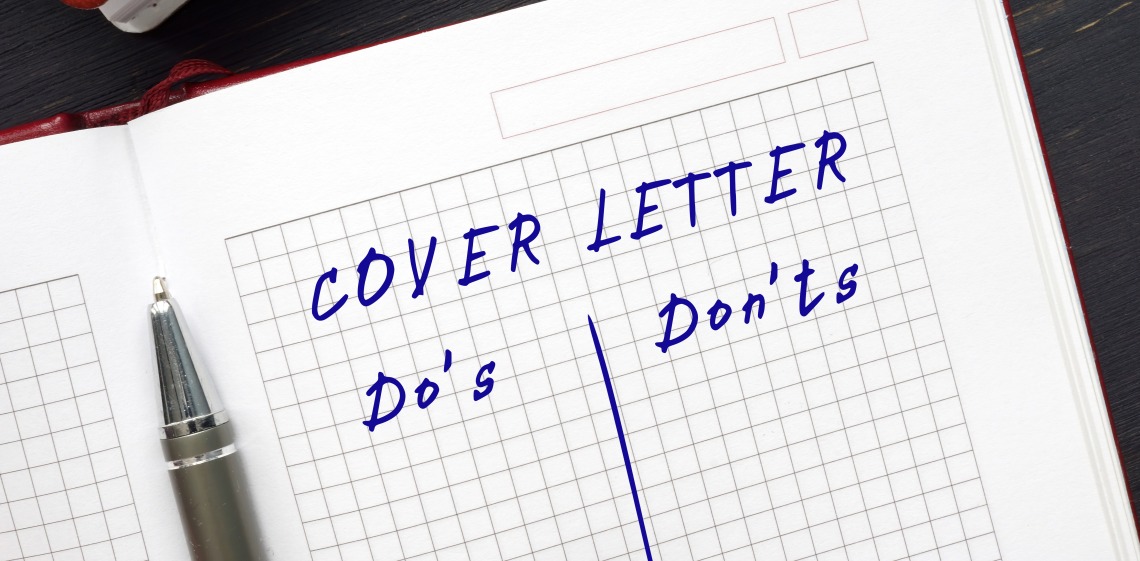
Cover letters can help differentiate you from other job applicants and be the determining factor of landing your dream job. By taking the time to craft a custom cover letter, a single sheet of paper can help communicate all the human elements that a resume may fall short of capturing about yourself.
But what do employers and recruiters have to say about how to write a cover letter? What are the best tips they have to offer for graduate students who are writing a cover letter?
We asked 11 employers for their best cover letter tips. Here is what they had to share.
Let it Set the Stage
In many ways, cover letters should provide background information and context to your resume, while simultaneously addressing how that resume addresses the specific requirements of the job opportunity. The cover letter is your opportunity to "set the stage" and to convince the hiring manager why your specific set of skills, experiences and interests will provide value to their team and its objectives.
Andrew Horrigan '11 BSBA (Management Information Systems), Product Manager at Cisco
Research the Hiring Manager
If possible, find out who the hiring manager is and look them up on LinkedIn. Do your research on the company you're applying for. What's their mission statement and how do they portray their company culture? Hopefully what you're looking for in a job is reflected by those things. Make sure the hiring manager knows that and understands who you are and what drives you. A resume is often about as robotic as things can be. Make sure your cover letter is the opposite—personalize it and let yourself shine through.
Joshua Schlag ’05 BS (Computer Science) ’11 MBA, Digital Marketing Manager at Pyramid Analytics
Utilize Career Development Resources
The University of Arizona and Eller College of Management go to great lengths to make sure students are prepared for their impending career journey. Because cover letters are so important to getting your foot in the door, there are several career development resources online and on campus to take advantage of. The university’s cover letter builder serves as a nice template to get started. And of course, it never hurts to make an appointment with an Eller Career Coach through eSMS to have a professional review your letter before submission.
Brett Farmiloe, ’06 BSBA (Accounting), Founder, Featured
Discover Past Samples of the Position
Do your research on the company and personalize your cover letter to the role for which you are applying. Don't be afraid to Google, "How to write a good cover letter for X position." Seriously, it helps! There is so much information out there from various perspectives—applicants, hiring managers, etc. Most importantly be yourself and let your personality come through. And don't forget to spell check!
Mariam Nikola '17 MS MIS, Consultant at Point B
Highlight Your Soft Skills
When writing a professional cover letter, there are a couple things you can do to set yourself apart from the pack. First, make sure you tailor your letter to the specific position you are applying for. This should not be a general, "one size fits all" letter—be sure to discuss specific details surrounding the role or the company itself. Secondly, this is an opportunity for you to show a little bit of your personality. Obviously, you want to remain professional, but this is a great time to highlight some of your soft skills that might not be fully conveyed through your resume.
Brian Ellis ’17 BSBA (Management), Staffing Manager at Randstad Office and Administrative Professionals
Fill in the “Why” Gaps
As a talent advisor, I review a lot of applicants and agree that a cover letter can be a great way to stand apart, if it is done correctly. A great cover letter for me covers the ‘why’ that I cannot understand from just a resume alone. It should clearly state why you are interested in the role, what your goals are for utilizing your graduate degree (if recently graduated) and explain any career pivots reflected on your resume. If you answer those questions in a direct, concise manner it will add value to your application.
Monica Larson , ’11 BSBA (Marketing) ‘20 MBA, Talent Advisor
Tell Your Story
A cover letter is your opportunity to tell your story—tying your experience and personal interests into why you want a position and why you are the best candidate for it. Paint the picture of your journey and what about the position excites you personally and professionally. Similar to your resume, keep it short and sweet. No need to repeat what’s already on your resume. Recruiters and hiring managers don’t have time to comb through a novel, so you need to engage them with as few words as possible while also grabbing their attention.
Kelly Castoro, ’06 BA (Spanish, Portuguese), Project Manager at Squarespace
Tailor Each Cover Letter to the Position You Are Applying
Be sure to research the role and customize your cover letter for each position, relating your experience to the particular role you are applying for. Personalization is key—research who you are sending the cover letter to and address the letter to them directly. End your letter with a call to action, stating you will follow up by phone or email if you haven’t heard from anyone. Follow ups are very important!
Jessica Rosenzweig, ’15 BSBA (Business Management), Account Manager at PeopleWare Staffing
Communicate Bankability and Personality
Your cover letter answers two crucial questions; are you bankable and are you someone the company will enjoy working with? Communicate bankability with your knowledge of the company, industry and why your skills, capabilities and interests are a great fit. Share your passion for their mission, culture, brand—whatever excites you about becoming a member of their team.
When conveyed through a concise, well-formulated, well-worded cover letter, you demonstrate the ability to write an effective business case—communicating that you are a ready professional and worthy teammate who will hit the ground running.
Theresa L Garcia, ’83 BSBA (Human Resources), Senior Change Management and Organization Capability Consultant at Boeing
Keep it Concise but Compelling
A cover letter is your chance to speak directly to the hiring team and tell them why you are not only the best match for the position for which you are applying but also give them additional insight into yourself as an individual that is less visible from your experience.
A great cover letter should be attention grabbing and touch upon the qualities that make you stand out from others in the applicant pool, highlight both your recent and most distinguished accomplishments and drive home why you are the right person for the job. Professionalism is always important, but don’t be hesitant to put your voice into the letter to let your personality shine through. Research the company, understand where they currently are, where they are going and show why you are the right person to get them from point A to point B. Recruiters spend a lot of time reviewing applicants and making yourself stand apart from the crowd is key. Keep it concise but compelling!
Matt Reineberg, ’14 BSBA (Marketing), Senior Talent Acquisition Sourcer at Cox Enterprises
Highlight the “Why”
Why are you applying to this company? Why do you want this position? Your cover letter should aim to answer the why behind applying for the job. Conveying an interest and excitement for working specifically for this job at this company, rather than a desire to get any job anywhere that will give you money, can go a long way. Show the company that they should hire you and your passion over someone that might have the skills needed for the job, but doesn’t care about the work as much as you do.
Ryan Nouis, Trupath
Ready to Learn More?

IMAGES
COMMENTS
The information in your cover letter's header should match your resume's header. In a perfect world, these two documents have the same design and make a cohesive package.Include your full name in the header, usually in a larger font. You also want to include your credentials (e.g., Jane Otto, BSN, RN).
Benefits of Writing a Nursing Cover Letter. Most candidates don't take the time to create a cover letter. In the world of online applications, attaching one is usually optional and feels like extra work. So many applicants fill out the bare minimum and move on to the next job posting. Stand out from the competition - Write a killer cover letter.
1. Highlight nursing skills. As a nurse, your duties vary depending on your specialization and the type of facility you work in. A strong nursing cover letter should highlight your clinical experience and a good mix of the hard and soft skills essential to your field of nursing. For example, if you're applying to be a nurse practitioner ...
2. Write an opening paragraph. After your header, start your cover letter by offering a professional greeting. Use a greeting like "Dear Hiring Manager" to address the reader, or address the reader by name if possible. Once you've greeted the reader, write a paragraph introducing yourself.
Salutation. Dear [hiring manager's name] or—. Dear Hiring Manager (if you can't find the name) Main Body: Three-Paragraph Nurse Cover Letter Format. 1) A "hook.". The most pulse-quickening fact about you. (In a nursing internship cover letter, that might be a commendation from a teacher.) 2) Say why you want the job.
Formatting : Leave your name out of your address if using a block format. Date: Every letter needs a date, even a cover letter. Include the date near the top, and make sure it reflects the day you submit, not the day you started writing. Formatting : Write the full date, e.g., January 5, 2023.
Your nursing cover letter should usually have five sections, in this order: 1. Heading. At the top of the page, include: Your name and contact information. The date. The recipient's name, title, organization, and contact information (when available) (Note: Feel free to omit this section if you send your letter by email and your contact ...
Here's how to write a registered nurse cover letter: 1. Use the best registered nurse cover letter format. Set the margins to 1 inch on each side. Use single line or 1.15 line spacing. Make sure you choose readable font (11 to 12pt). 2. Put relevant information in your RN cover letter header.
Career Resources / Job Searching / Nursing Cover Letter. Reviewed by: Kiley Griffin, R.N. Writing an effective nursing cover letter may seem unnecessary-trust us: it's not. Roughly 45% of job seekers send resumes without a cover letter. Yet, a majority of employers prefer cover letters to go with a resume.
How to write a registered nurse cover letter. Follow these steps to communicate your qualifications in a registered nurse cover letter: 1. Outline the header. The header appears at the top left corner of the document. It allows the hiring manager to know who is authoring the cover letter. Include information that helps the employer identify you.
Here's how to write a cover letter for nursing jobs with a clean bill of health: 1. Format a Nursing Cover Letter Like Any Formal Document. Your ICU or graduate nurse cover letter has to make a great first impression. And— Not only with the words you include, but also with how you format the cover letter.
Once you're ready, follow these steps to write your nursing cover letter: 1. Explain why you're writing the cover letter. One of the first things to explain in your cover letter is which job you're applying for. Recruiters often receive applications for many different jobs, and may appreciate the clarity. You can also mention where you saw the ...
Tips For Writing A Nursing Cover Letter. Writing an exceptional nursing cover letter is vital for capturing the attention of healthcare employers. These practical tips will guide you in crafting a compelling and effective cover letter that distinguishes you in the competitive nursing field: Tailor for Each Application: Customize your nursing ...
A registered nurse's cover letter should always be in formal letterhead format, including: Your full name, address, email, and phone number. The date. The employer/institution's full name and mailing address. Salutation ("Dear Hiring Manager/Nurse Recruiter" or "To Whom It May Concern")
Write your cover letter in the body of an email/message. When writing your Nurse cover letter, it's best to type the content into the body of your email (or the job site messaging system) and not to attach the cover letter as a separate document.. This ensures that your cover letter gets seen as soon as a recruiter or employer opens your message.
3. Use the correct cover letter format. Just as the content of your cover letter should be attention-grabbing and mistake-free, your new grad nurse cover letter format should be structured, clean, and straight to the point. To create a professional-looking application, stick to the following cover letter format: List your contact details in the ...
The first step in writing a quality nurse cover letter is ensuring that it includes the required information and follows the standard format. Here is a quick overview of what you need to include: Your contact information. The date. The addressee's contact information. The job listing or title.
2. Write the date. Enter the date below your contact information. Typically, the date should reflect the day you plan to send your nursing cover letter, so you can track your application. Write the date in full and avoid abbreviations when dating the letter. For example, "April 25, 2021" is an acceptable format. 3.
Nursing covers a vast blend of soft, hard and technical skills. Use our Cover Letter Builder to source tailored nursing skills based on your professional experience. Try this starter list of 15 technical registered nursing skills or accomplishments that you could feature on your cover letter: 1. Proficiency in patient assessment.
Here's how it works: 1 Head to ChatGPT (you'll need to create an account - it's free) 2 Ask ChatGPT, "Please write me a cover letter for a nursing role. The role I'm applying for is [Job Title] role at [Employer]. Here is the job description: [Paste Job Description]. And here is my resume: [Paste Resume].
Adhering to a template and the 12 steps listed below will simplify the writing of your new graduate nurse cover letter. It is recommended to approach resume writing in divided steps to make the task less daunting. First, write a rough draft, letting your ideas flow.
2. Write the date and company name and greet the hiring manager. Under your contact details, you can write the date you're writing your cover letter. The hiring manager may reference this date to confirm you've applied for the role before the application deadline. On the next line, you can write the name of the organisation hiring a registered ...
When crafting a New Grad Nurse Cover Letter, you should include the following sections, each serving a specific purpose: 1. Personal and Contact Information. Include your full name, address, phone number, and email address at the top of the cover letter.
Nurses can address employment gaps at multiple points in the job application process: the resume, cover letter, and interview. Crafting a Nursing Resume. Your nursing resume is your ticket to getting in the door for an interview, so presenting your experiences and skills in the best light is crucial. When it comes to addressing employment gaps ...
How To Write a Nurse Resume. An attention-grabbing nursing resume will showcase your nursing certifications, experience, and accomplishments. To drive your nursing career forward, use specific information about the type of nursing work you've done before, including data such as patient load, efficiency rates, satisfaction rates, and number of team members you supervised, if applicable.
Instead, your cover letter should go beyond your work history to talk about things that make you especially well-suited for the job. For example, if you're applying for an assistant job that ...
Here are some examples of how you can describe yourself effectively in a cover letter using descriptive adjectives: Descriptive adjectives highlighting professional strengths As a highly motivated and results-driven professional, I have a proven track record of delivering exceptional results in fast-paced environments.
How to write a cover letter for an internship A cover letter is your chance to stand out from the crowded applicant pool. In this section, you'll learn nine high-impact tips to help you craft a cover letter highlighting your professionalism, aspirations, and qualifications. 1. Properly format your cover letter.
Tailor Each Cover Letter to the Position You Are Applying. Be sure to research the role and customize your cover letter for each position, relating your experience to the particular role you are applying for. Personalization is key—research who you are sending the cover letter to and address the letter to them directly.
Writing a Cover Letter; Writing a Cover Letter. February 01, 2024. Tips for writing a cover letter created by the Office of Career and Leadership Management. cover-letters_0.pdf 223.6 KB. Document Topics. Career and Leadership Management. Columbia School of Social Work 1255 Amsterdam Avenue · New York, NY 10027.